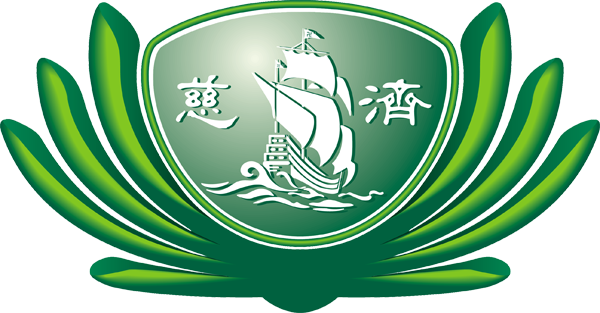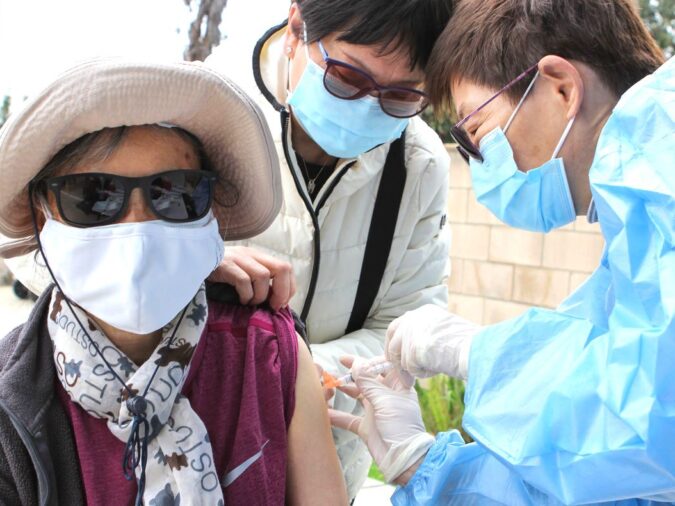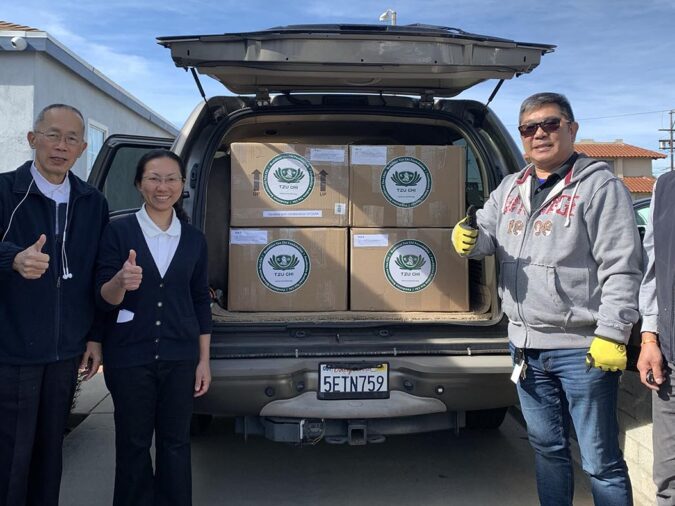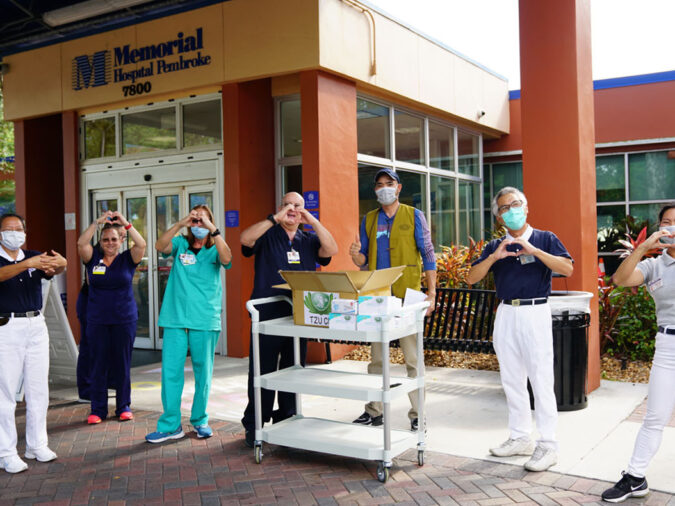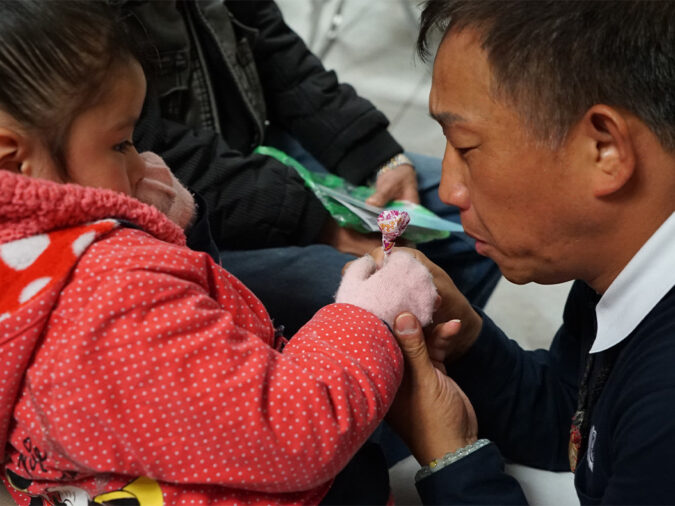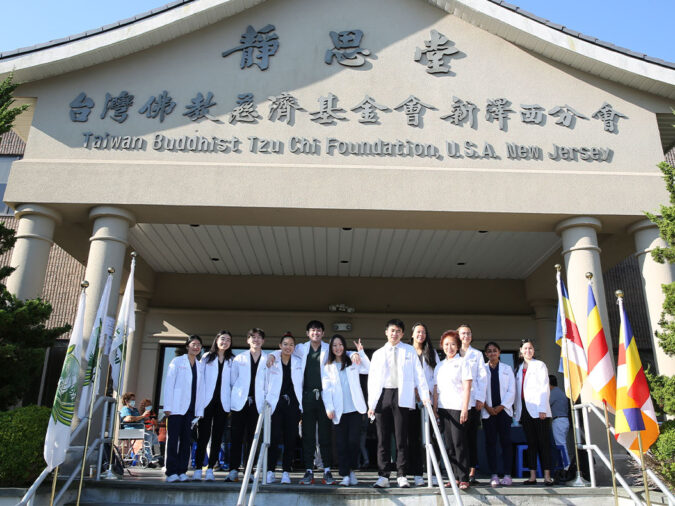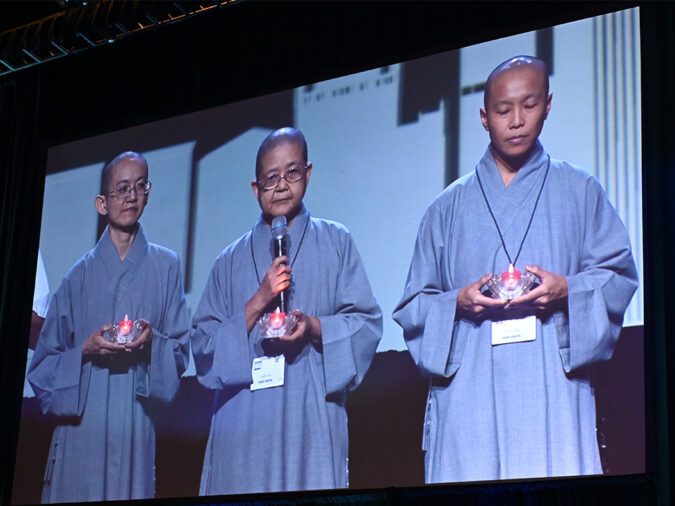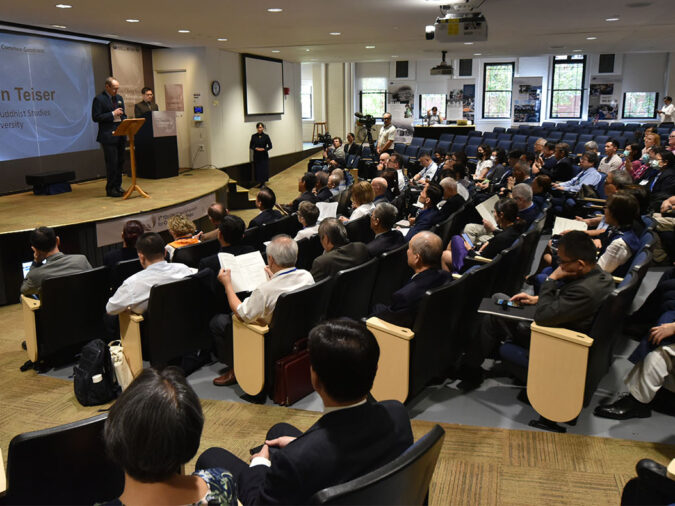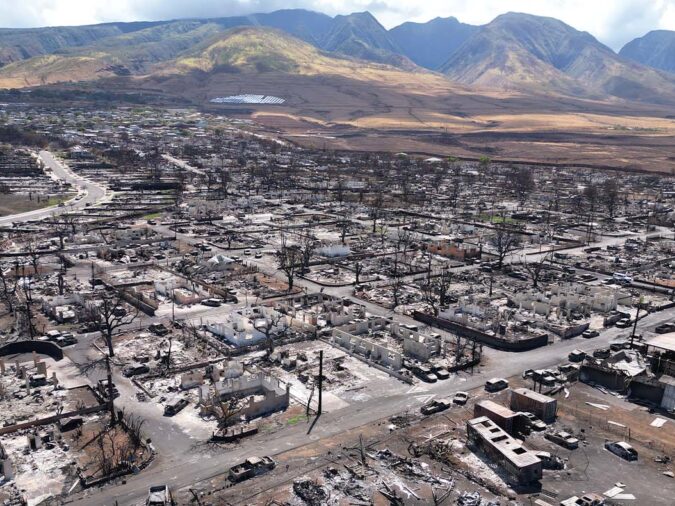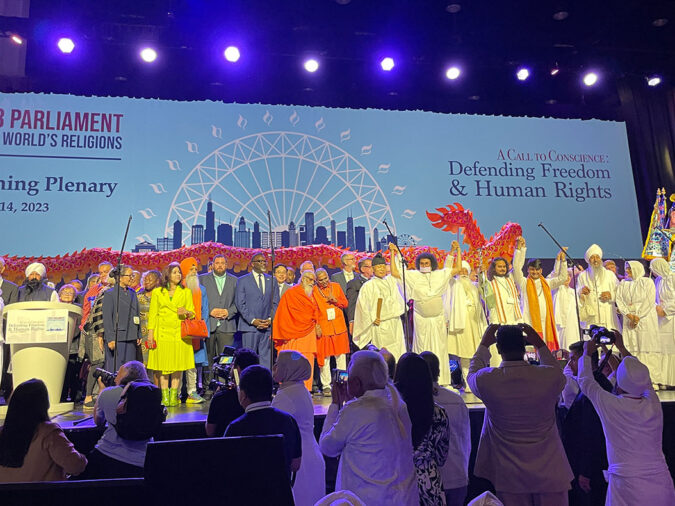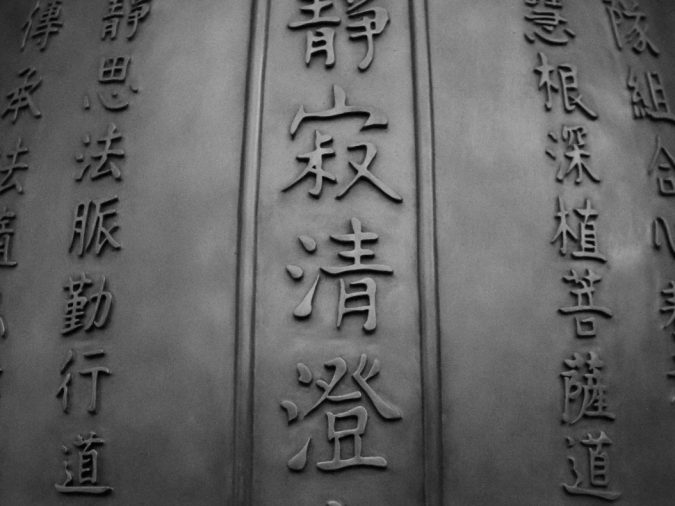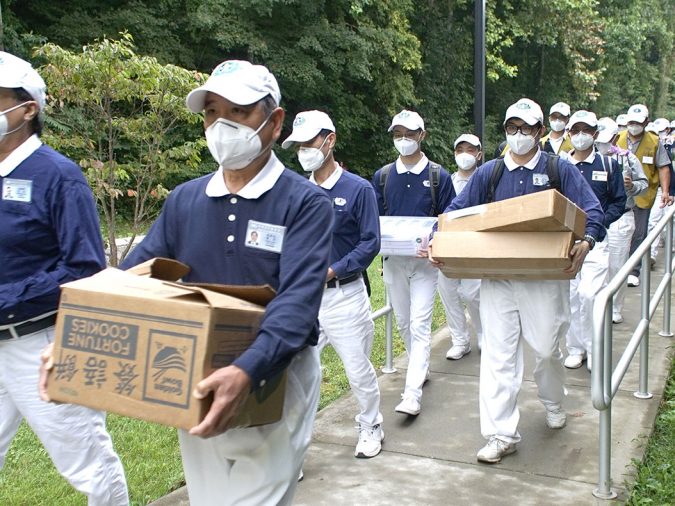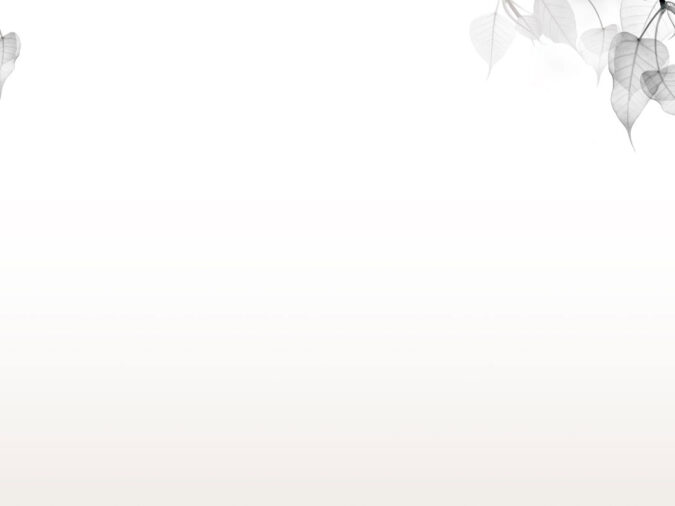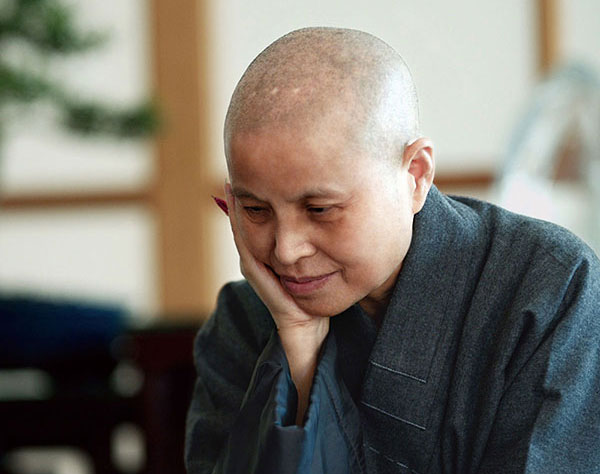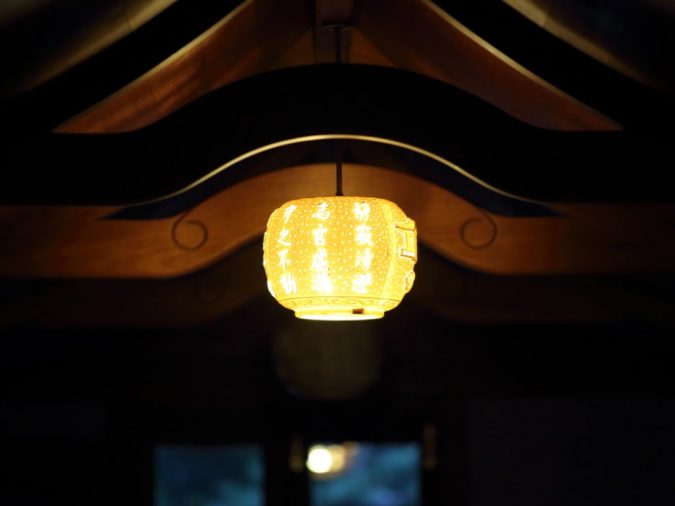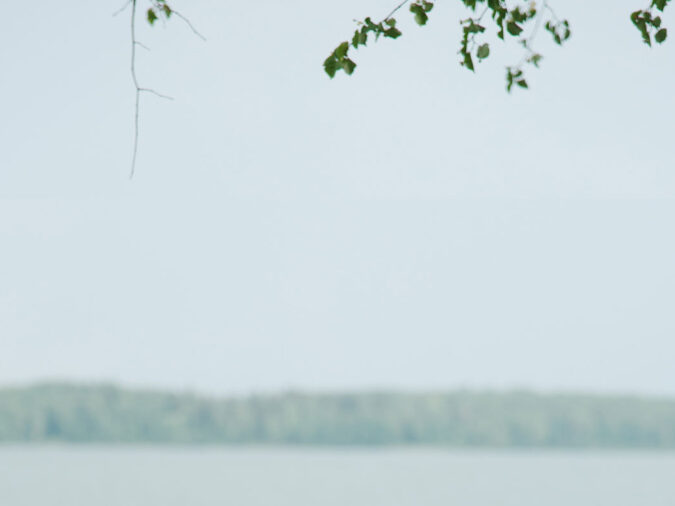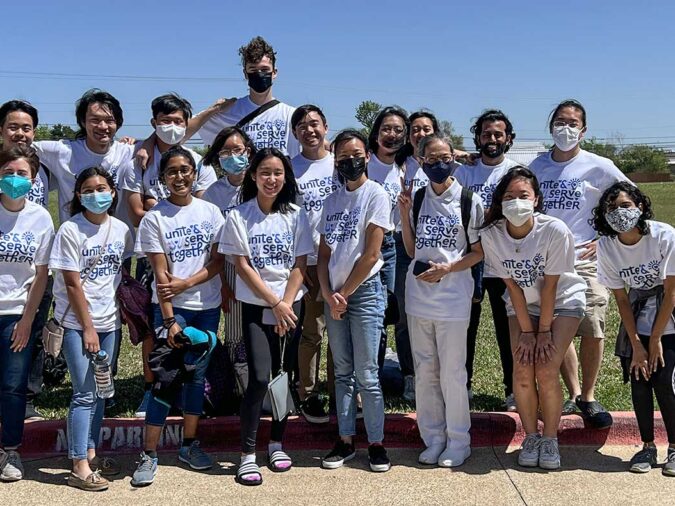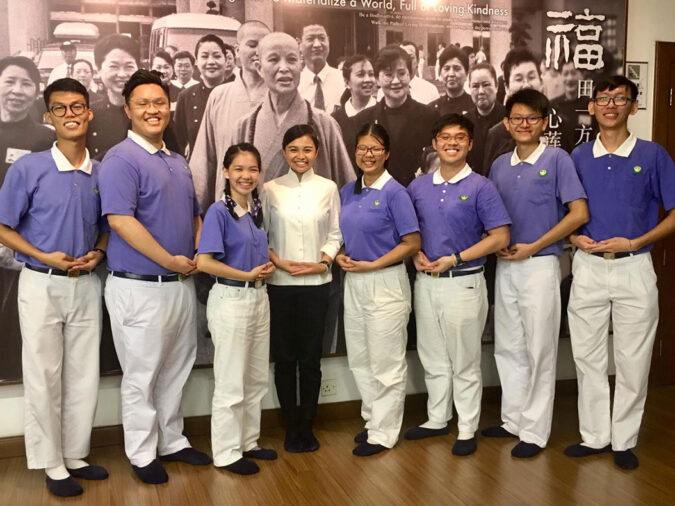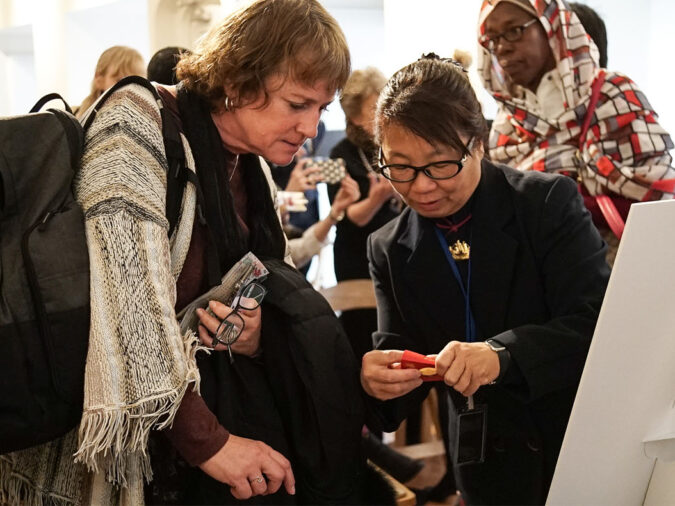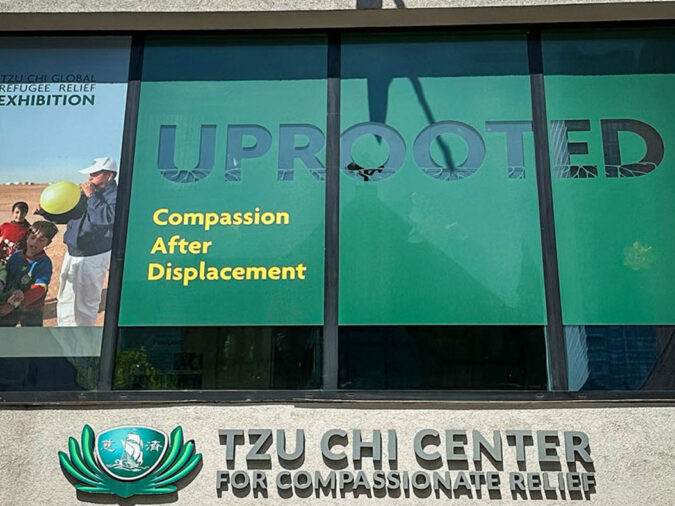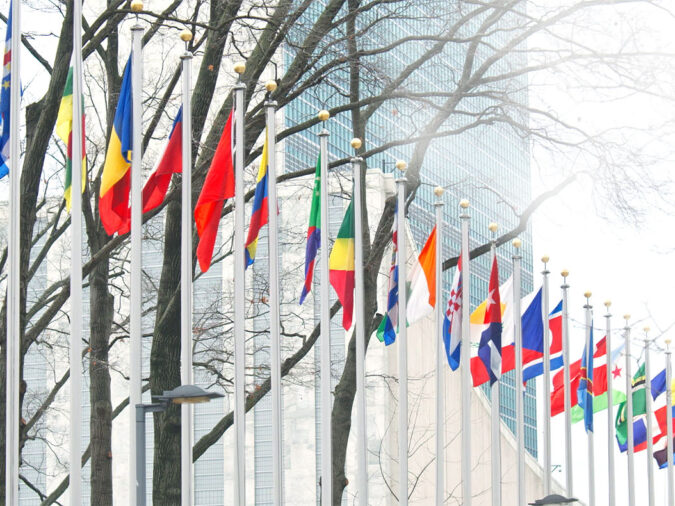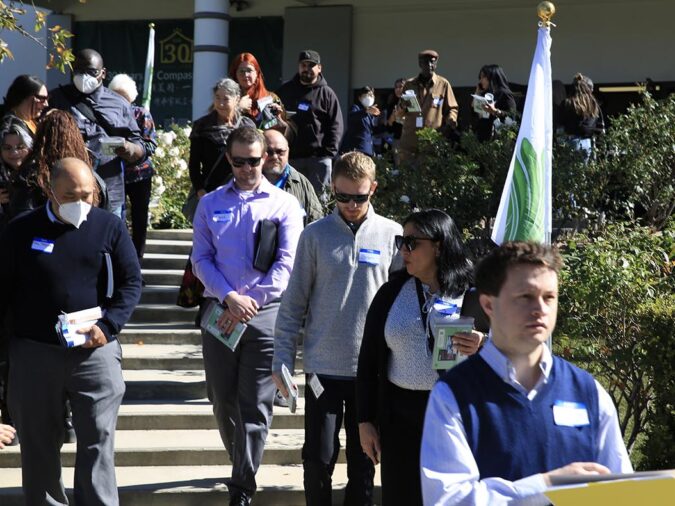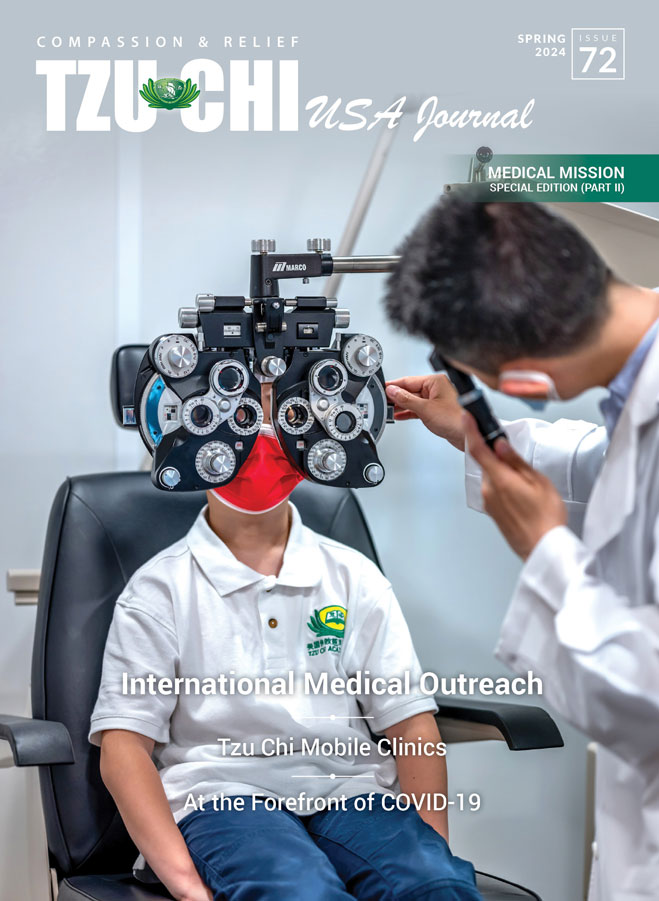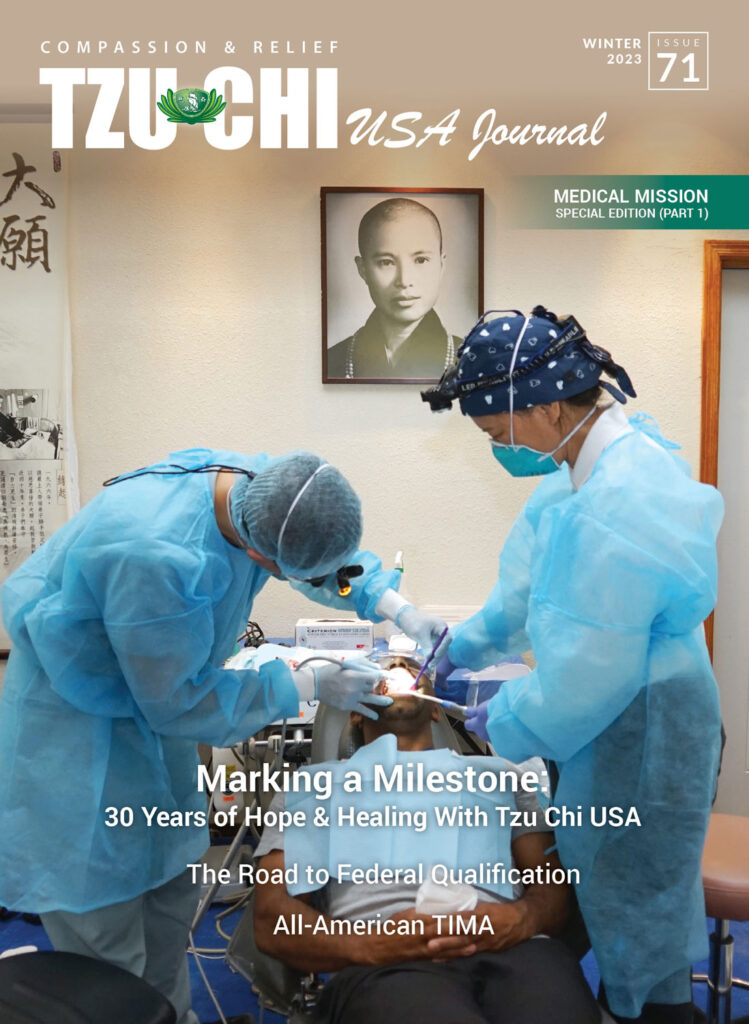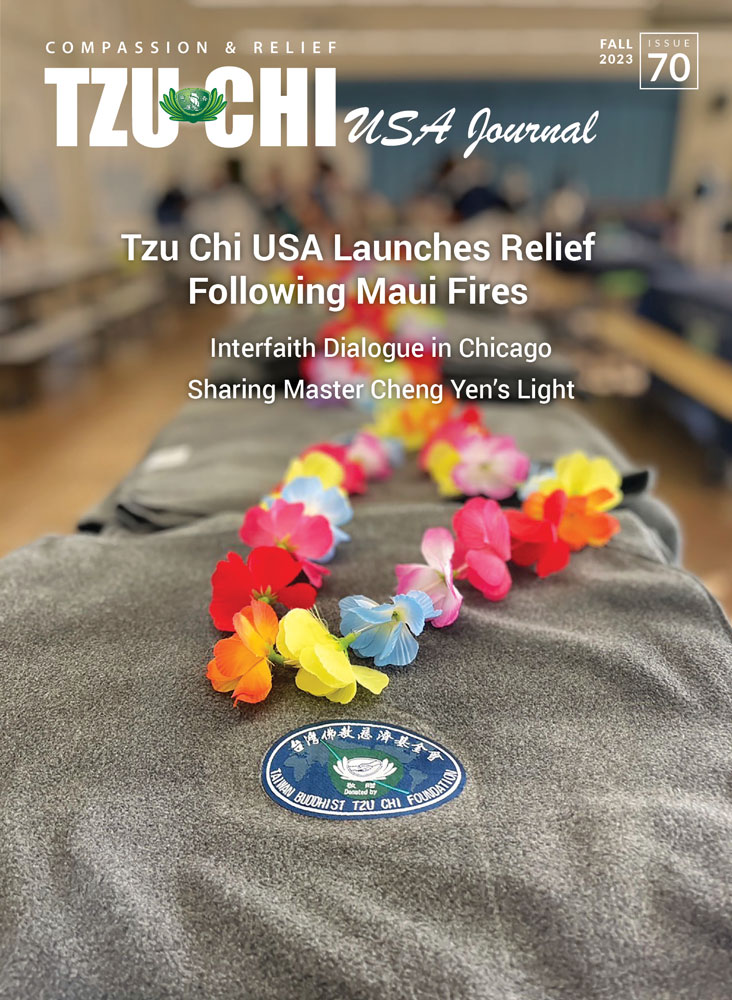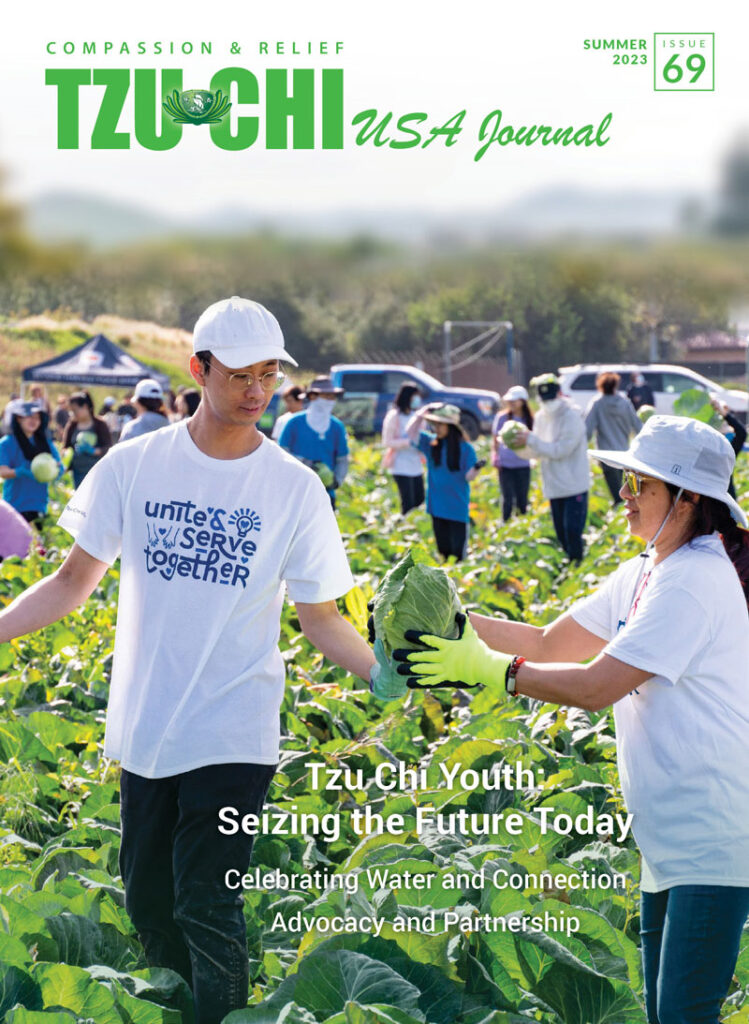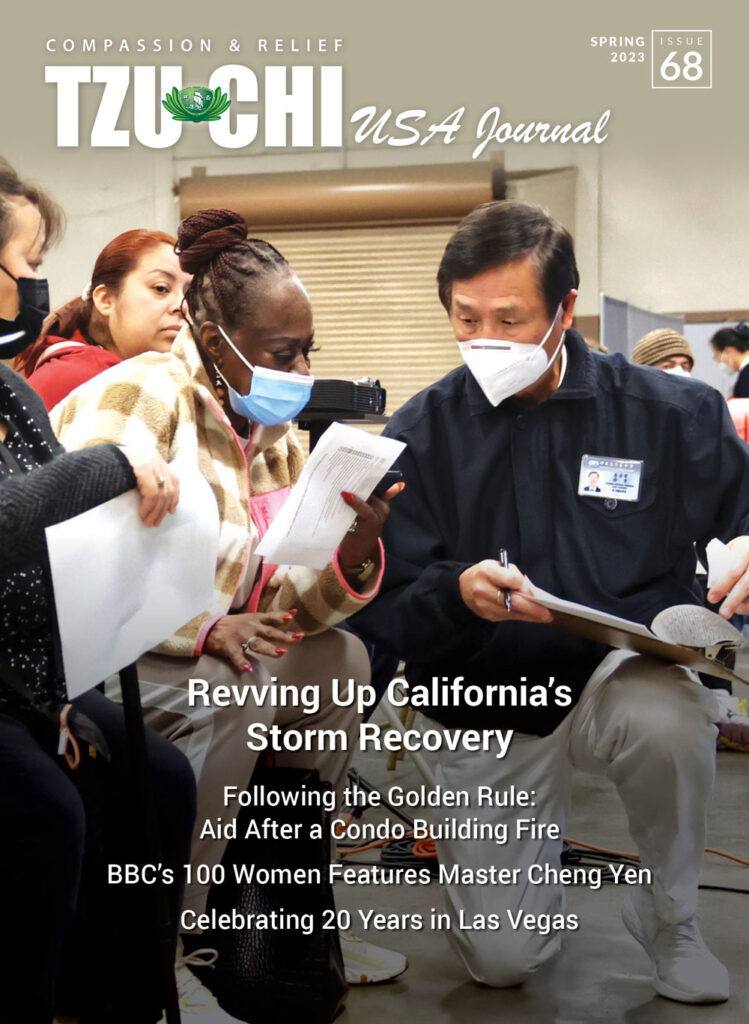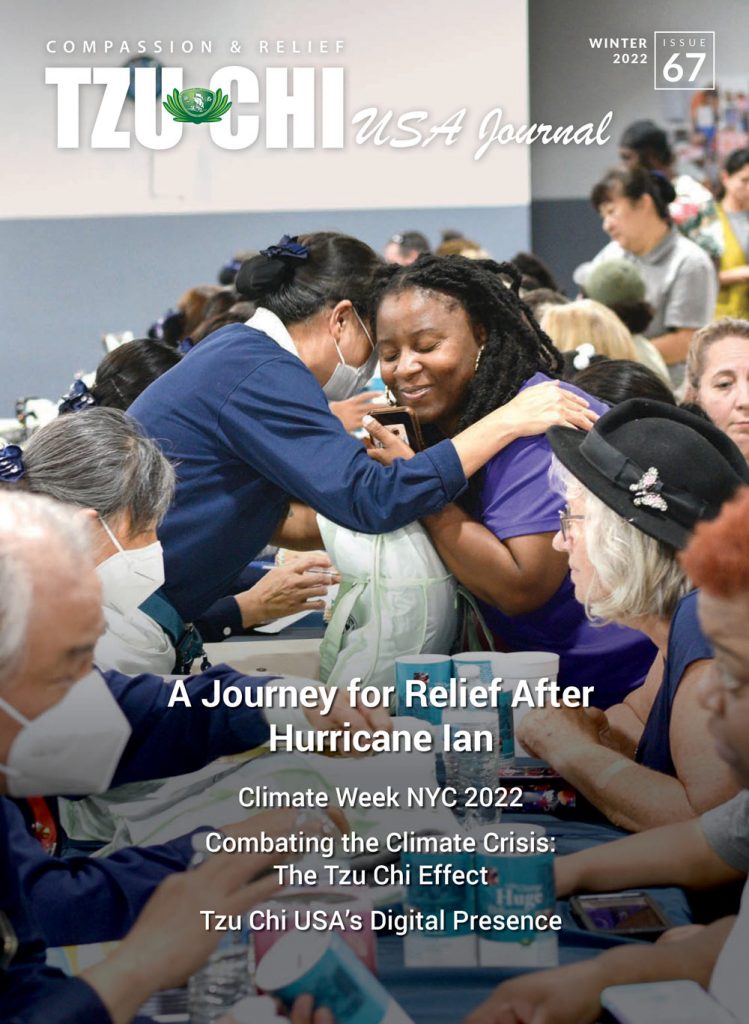CHAPTER 6
At the Forefront of COVID-19
The Scramble for PPE
Interviews by Tzu Chi USA Humanistic Culture Volunteers
Written by Dilber Shatursun and Pheel Wang,
with contributors Patrick McShane and Sophie X. Song
Published #72 | Spring 2024 Issue
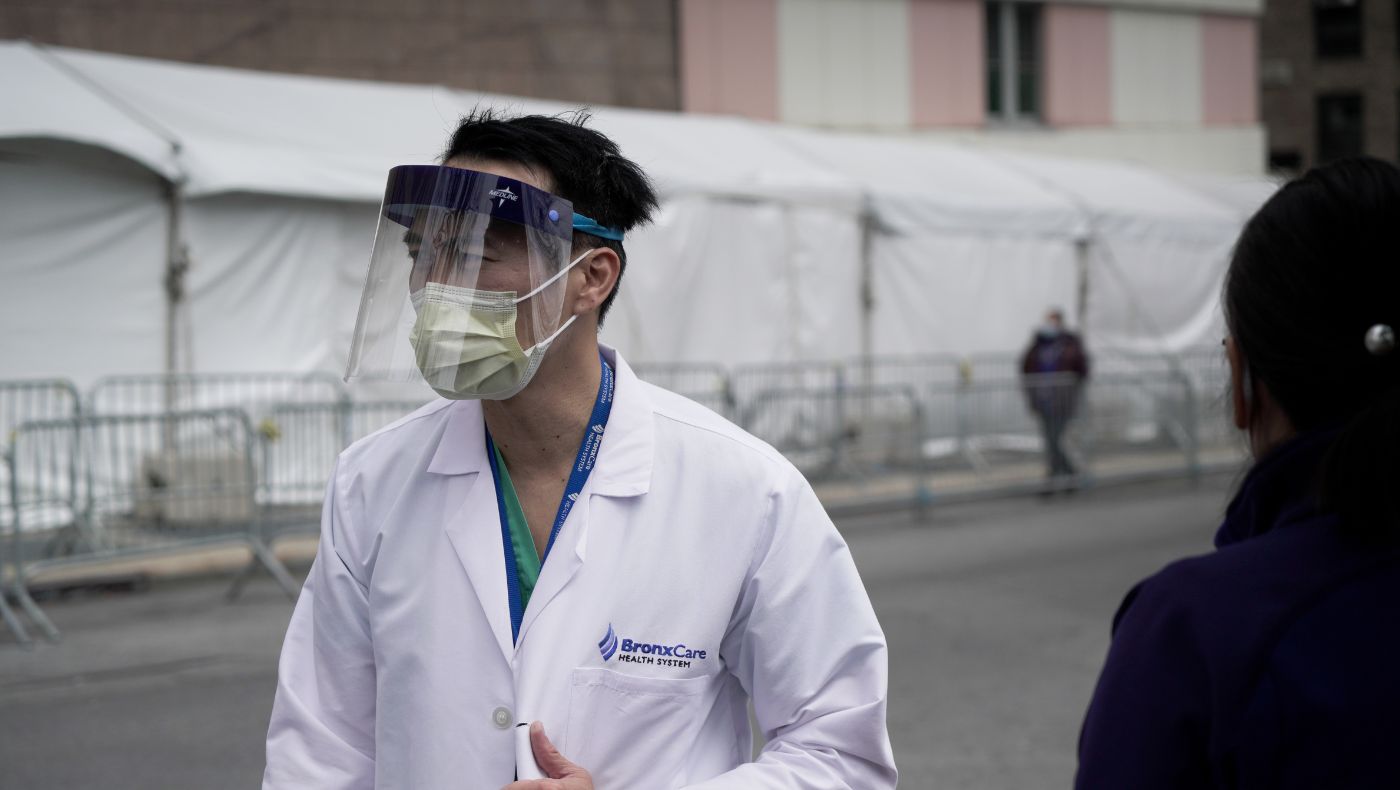
TIMA physician Dr. Richard Yang and Tzu Chi New York volunteer Chinsen Liu donate medical supplies to the Bronx Nursing Hospital for the first time. They are warmly received by Dr. Sridhar S. Chilmuri. Photo/Daphne Liu
SHARE
From March 2020, Tzu Chi volunteers at offices across the nation got to work. In addition to launching drive-thru grocery pickups, volunteers began acquiring what PPE they could, gathering in masks and maintaining distance from one another to pack everything. Many Good Samaritans also brought PPE to Tzu Chi offices to contribute to the cause. Dr. Liao commented that being able to respond quickly was all thanks to “the great love labor from Tzu Chi people, donors around the world.” Upon receiving one such donation of both N95s and surgical masks from Tzu Chi volunteers, Dr. Hla Myint, an internist at Woodhull Medical and Mental Health Center in Brooklyn, NY, reiterated that every piece mattered:
[It is] most important for healthcare providers to get N95s. But, these surgical masks were helpful enough, especially for the patients; when they come in, we can cover the patient to lessen the spread of infection.
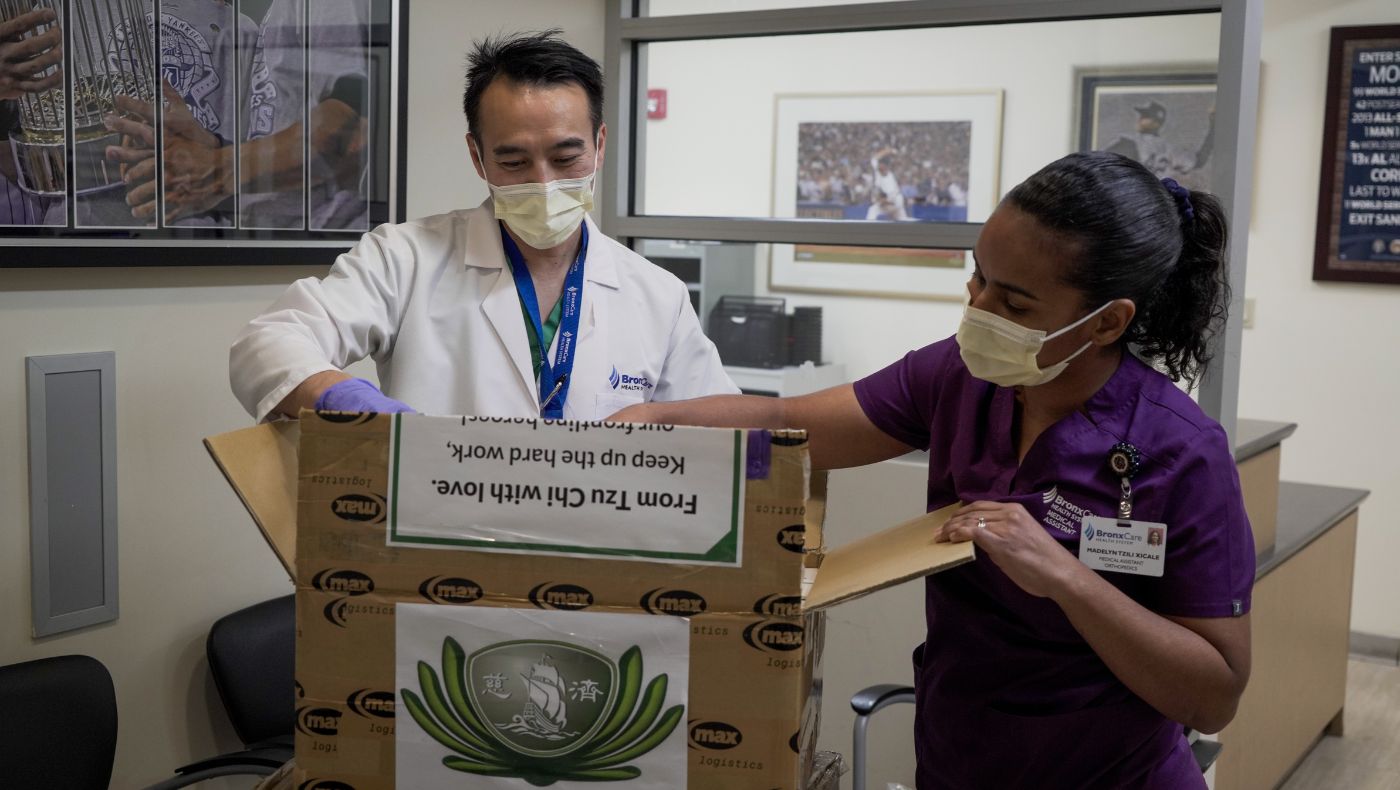
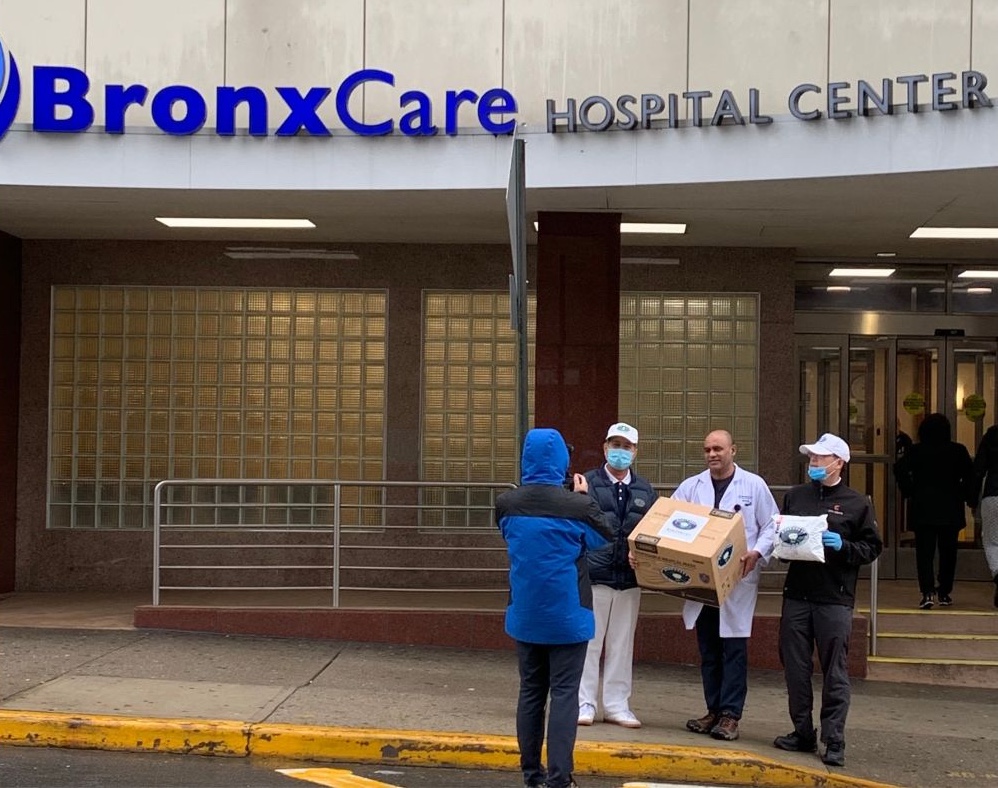
SHARE
Soon enough, requests for Tzu Chi’s help with PPE flooded in. Many of them came via Tzu Chi volunteers whose relatives were healthcare professionals, like Tzu Chi Las Vegas volunteer Grace Wong. Her son, Dr. David Wong, DPM, is a podiatric surgeon at the BronxCare Hospital Center. As New York City became the country’s epicenter, Dr. Wong was treating ‘COVID toes,’ or foot-related problems caused by COVID-19, requiring frequent visits to the hospital’s emergency department. During the City’s COVID-19 surge in late March and early April, he recalled that, “we had a hard time keeping them on the shelf, the PPE… There was even a week where I couldn’t get a mask for my surgeries.”
But, after seeing social media posts from Tzu Chi USA regarding PPE donations, he asked his mother if she knew if Tzu Chi New York might be able to help. A few phone calls and three days later, Dr. Wong received a delivery of several thousand surgical masks alongside Physician-in-Chief, Dr. Sridhar S. Chilmuri. Moved, Dr. Chilmuri explained: “It’s such an amazing amount of relief, because you’re tense; ‘do you have enough stock?,’ and all that stuff. And you have this deadly infection that’s already in the hospital and we’re taking care of people.” He went on:
I’ve been a physician for more than 30 years. This has been the roughest thing to witness and be part of. So, you know it’s not how much, it’s how timely it was and how easy it was to get the help we can.
For many, having some level of peace of mind in the midst of chaos was worth its weight in gold. Countless medical professionals, including medical students, found themselves thrust onto overwhelming scenarios beyond their experience. Forced to learn quickly, residents like BronxCare Dr. James Newman illustrated what it was like: “As family medicine residents, we’re more prone to be in the outpatient setting, but here, we’re intubating patients. Up until COVID-19, I didn’t ever have a patient die on me, and since COVID-19, I’ve had dozens. And I’m just one resident.” Sadly, he says this was only part of it:
Having to answer the phone, speak to the family, give them updates, and they can’t be here to see their family member, and sometimes, they’re never going to see their family member again… that’s very, very difficult to deal with.
Rising to the Challenge
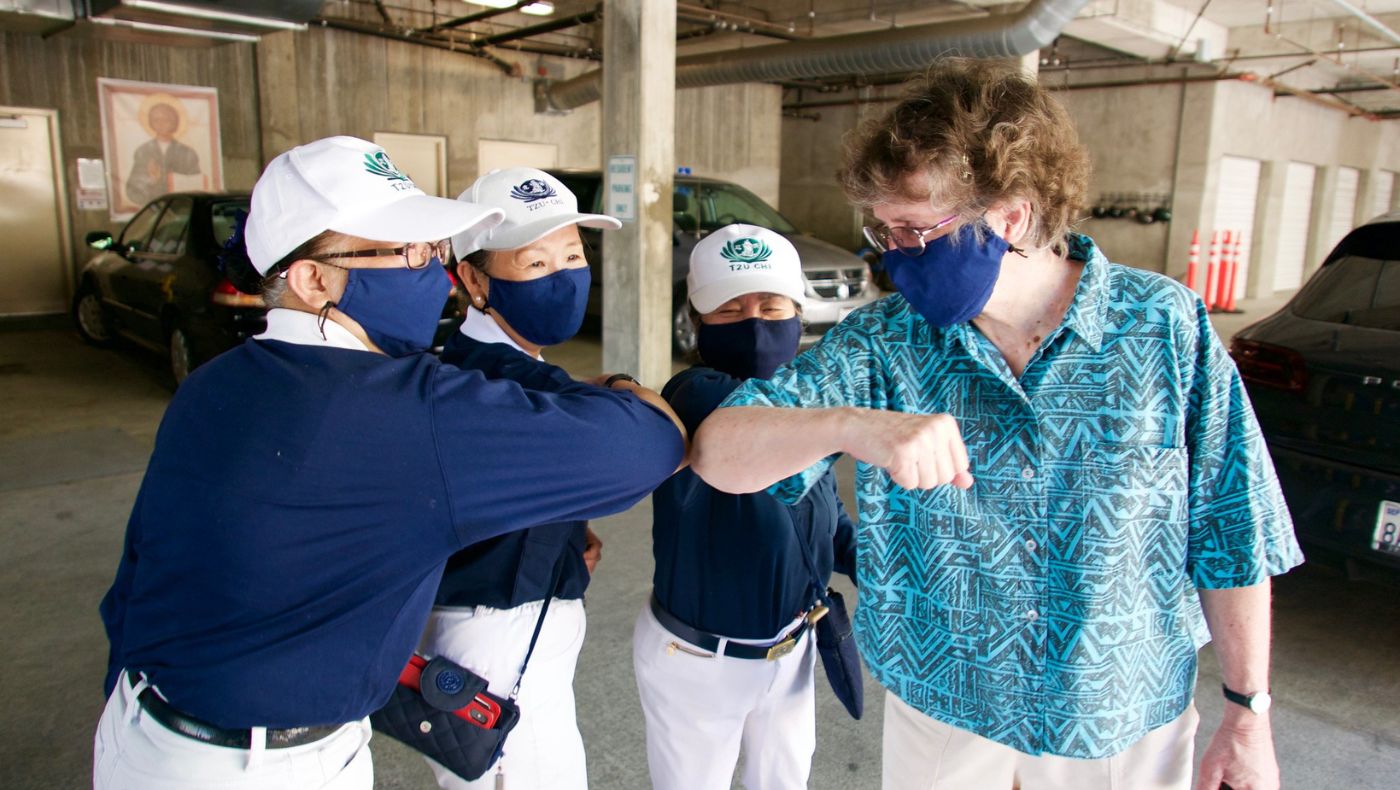
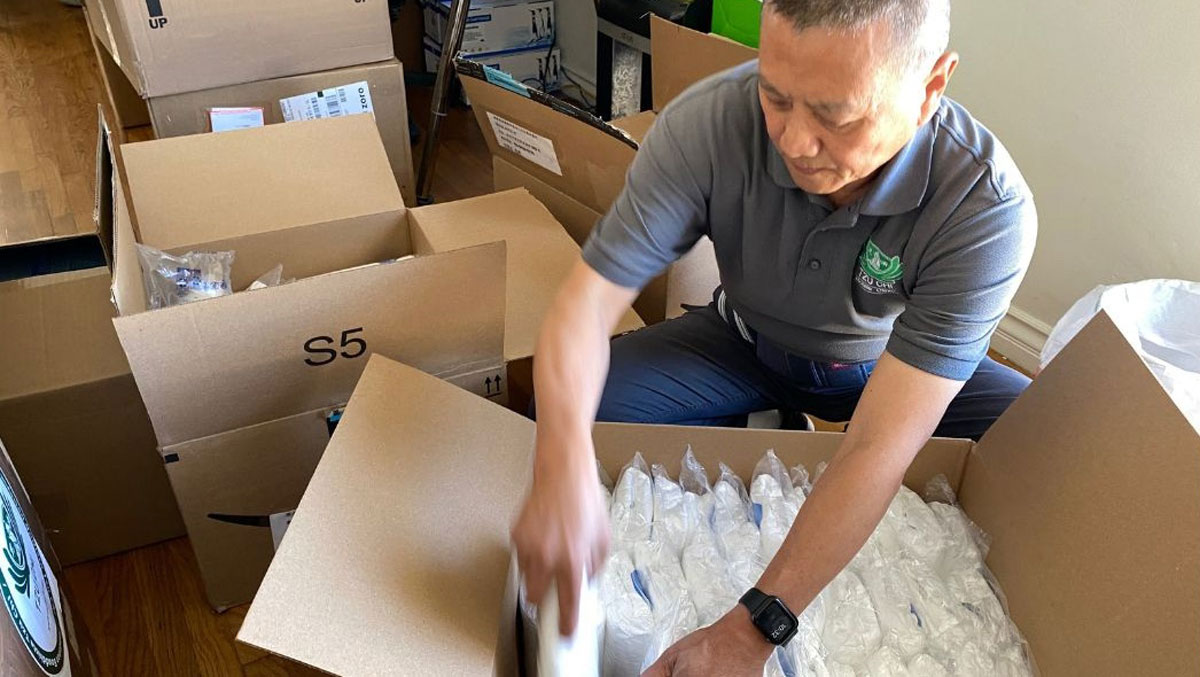
Resonating with the complex obstacles healthcare workers were facing, Tzu Chi volunteers were determined to overcome the challenges they faced. Aside from finding volunteers willing to come in person to receive the items at a Tzu Chi office, potentially sanitize those packages before bringing them inside, separating them, loading them onto vehicles, and coordinating with healthcare staff to hand off the materials, Dr. Keh elaborated on the simplest yet most arduous task of all – actually getting the PPE:
Even if I place an order for more masks, it can’t be bought. Most orders will be canceled, the receiving quantity changes, or it will take a long time to receive the goods. So, when buying masks and other medical supplies, until it is in your hands, it can’t be considered received. Only when you get the goods can you be assured that you can achieve the mission ‘possible.
This didn’t stop volunteers in cities across the country from doing their part. Up in San Jose, California, too, Tzu Chi USA Northwest Region volunteers formed the NorCal PPE Project Team, each helping with different tasks in their spare time. The Santa Clara Valley Medical and the Emergency Department of Kaiser Permanente’s San Jose Medical Center were just some of the many recipients. Motivated, Tzu Chi volunteer Samantha Mahaffey said “every hospital staff member who received a donation of PPE always expressed gratitude for Tzu Chi’s love and care.”
In doing all this work, Tzu Chi was forging new relationships beyond the healthcare sector. Tzu Chi volunteers from the San Francisco Branch brought both 240 N95s and 1,000 surgical masks to the San Francisco Fire Department. Receiving the donation, Community Affairs and Media Relations Officer Jonathan Baxter conveyed how encouraging it was for essential workers who weren’t necessarily in the health sector to receive PPE during the shortage: “Your paying forward lets our first-responders feel that we’re needed, and we can safely devote ourselves to protecting the public.”
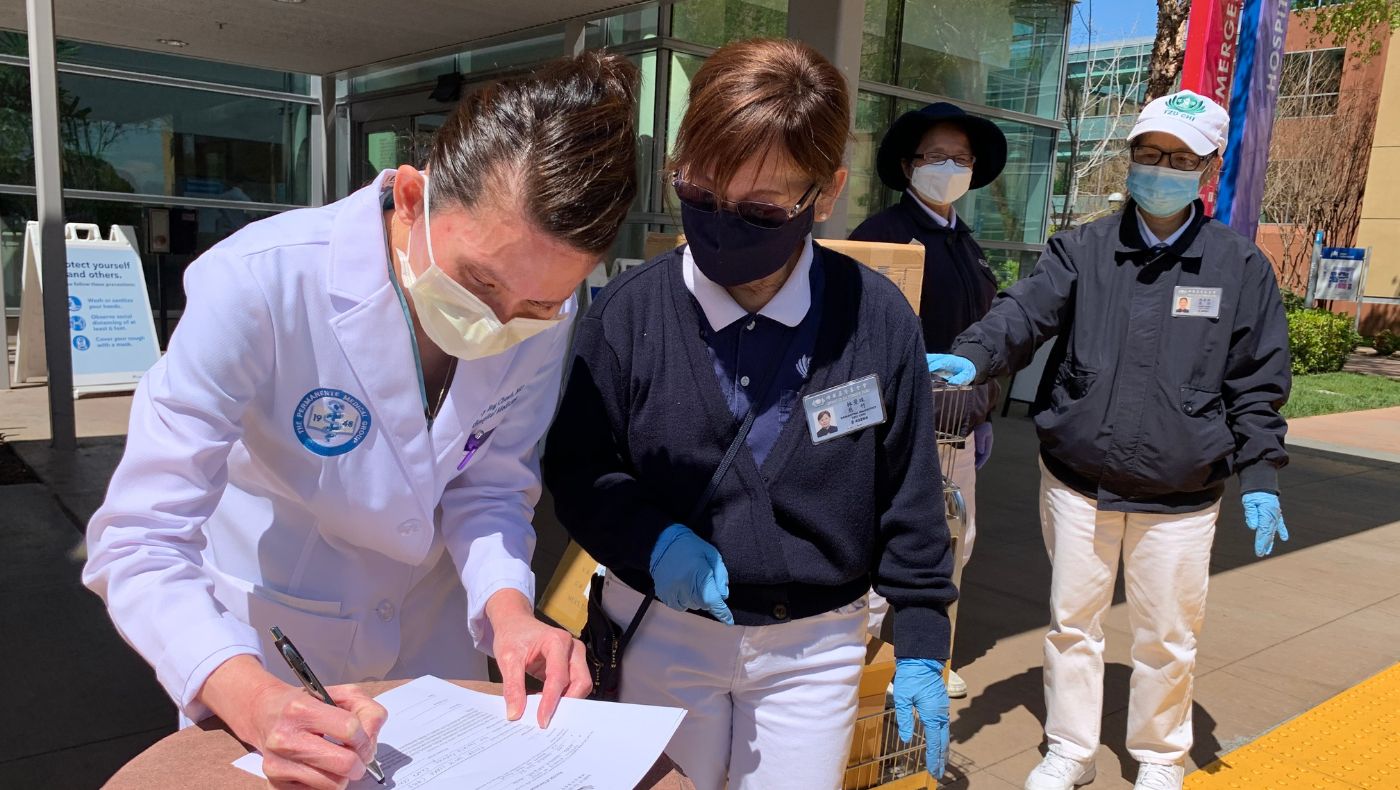
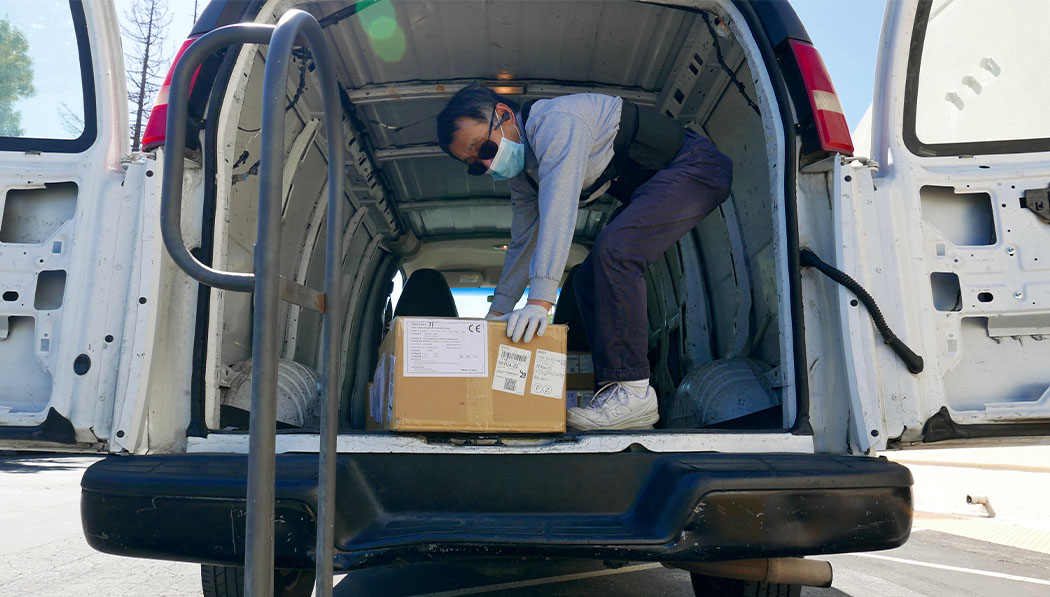
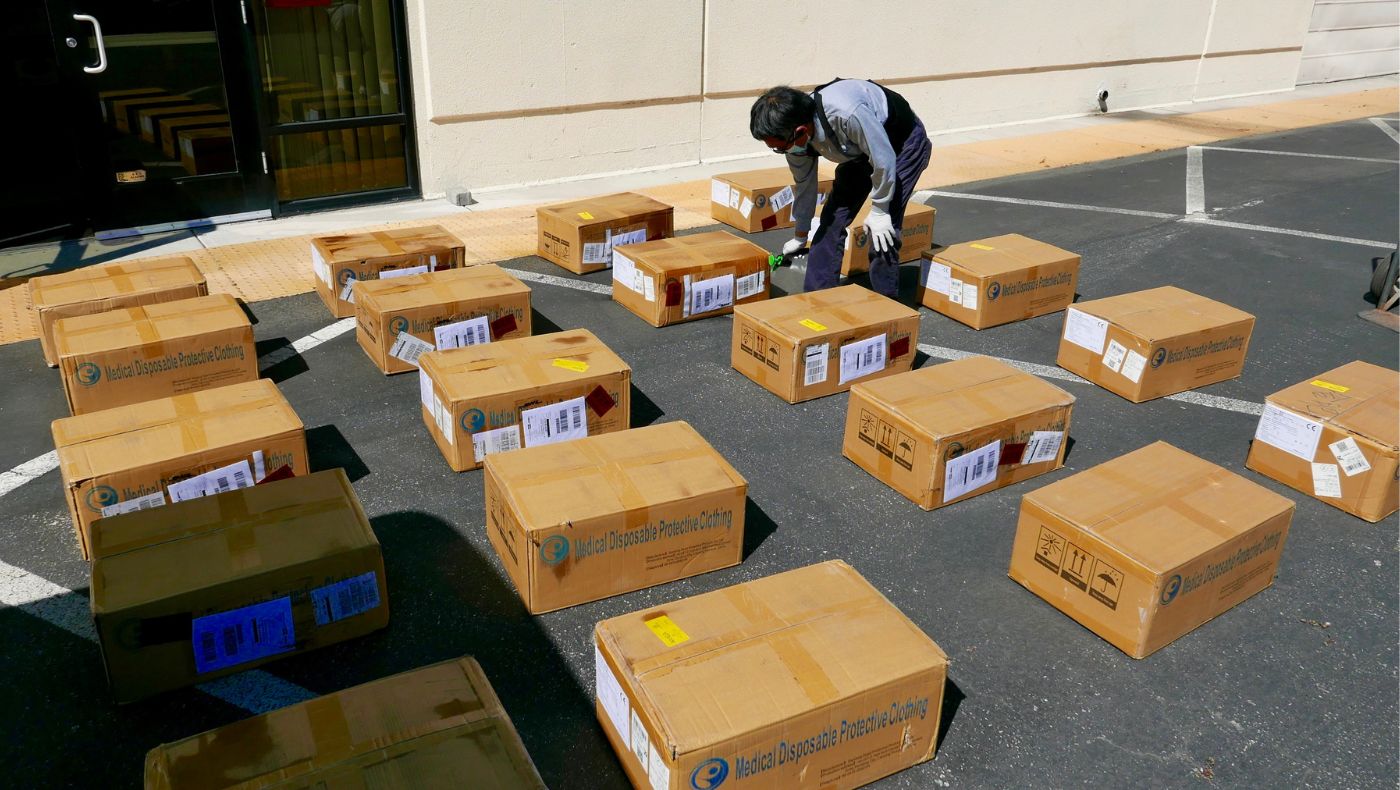
At the same time, connections with previous partners and long-time supporters of Tzu Chi deepened. In late March, California State Senator Connie M. Leyva requested PPE support for a Pomona homeless shelter called Hope for Home. Seeing the abundance of items donated, personally delivered by then-Tzu Chi USA CEO Jackson Chen and the late Deputy CEO Dr. Han Huang (including surgical masks, disinfecting spray and wipes, touchless forehead thermometers, and large bottles of hand sanitizer), she was touched:
I don’t know that any of us thought we would be living through the COVID-19 pandemic, and we feel so lucky here in District 20 that we can reach out to the [Buddhist] Tzu Chi Foundation for help.
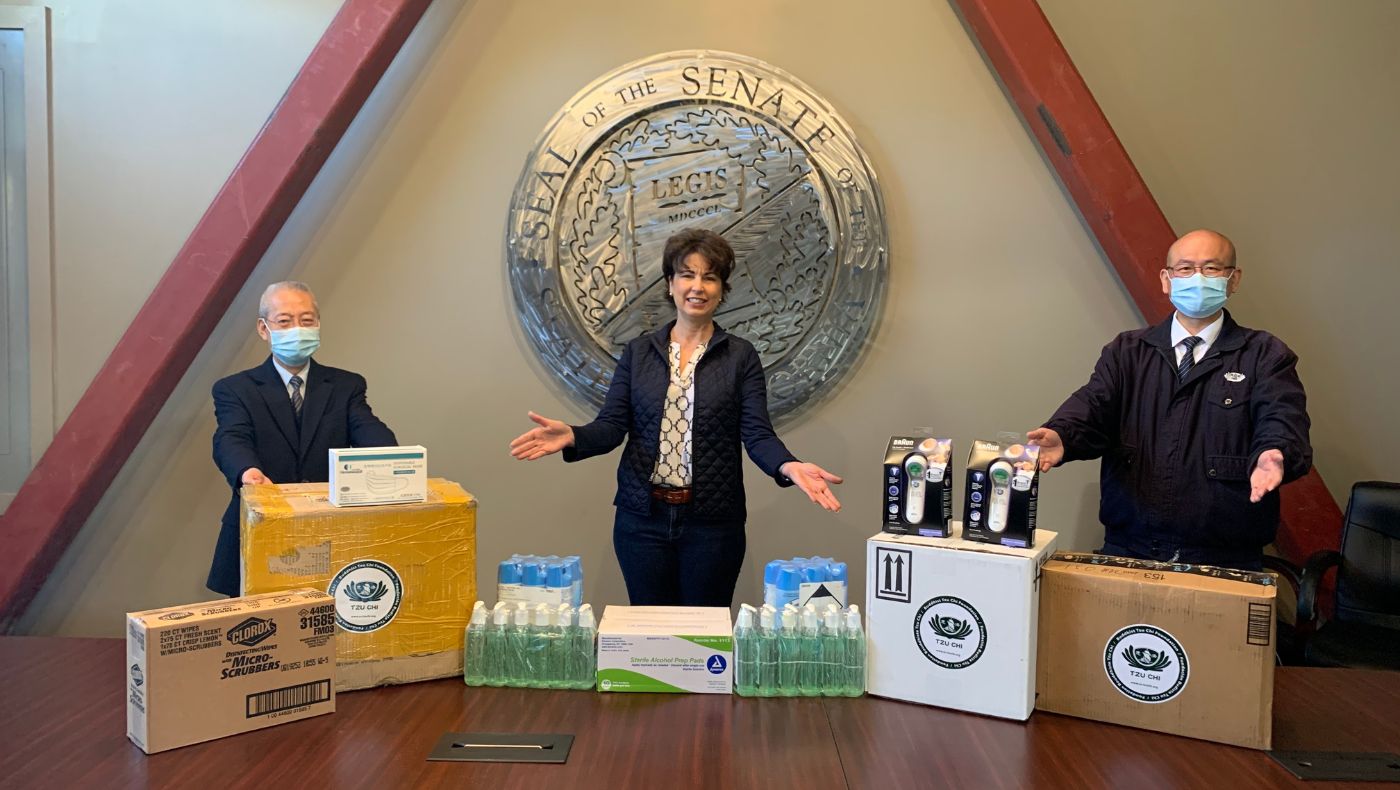
Safeguarding Every Corner of the Country: Tzu Chi USA’s Regional Response
In order to best serve all parts of the United States, Tzu Chi USA conducted more localized operations through nine regional offices, which each include additional local offices and service centers. Here are just some of their many achievements:
Northeast Region
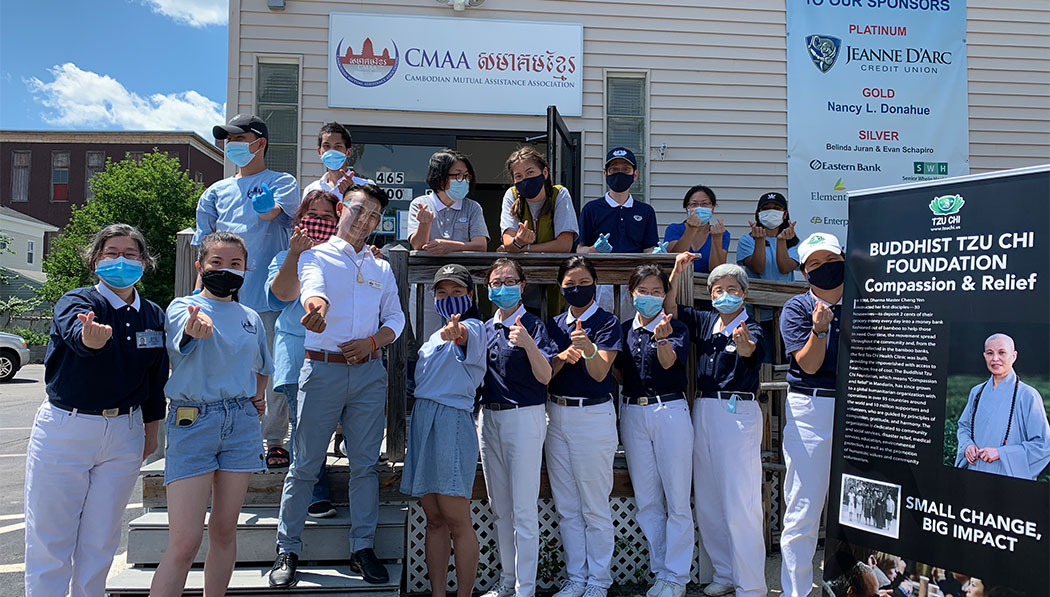
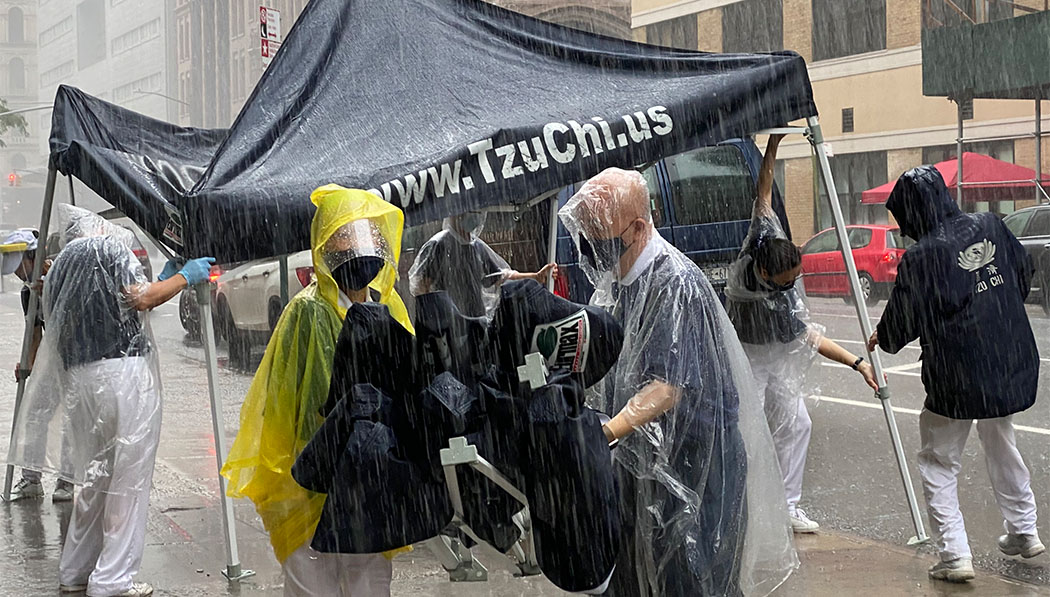
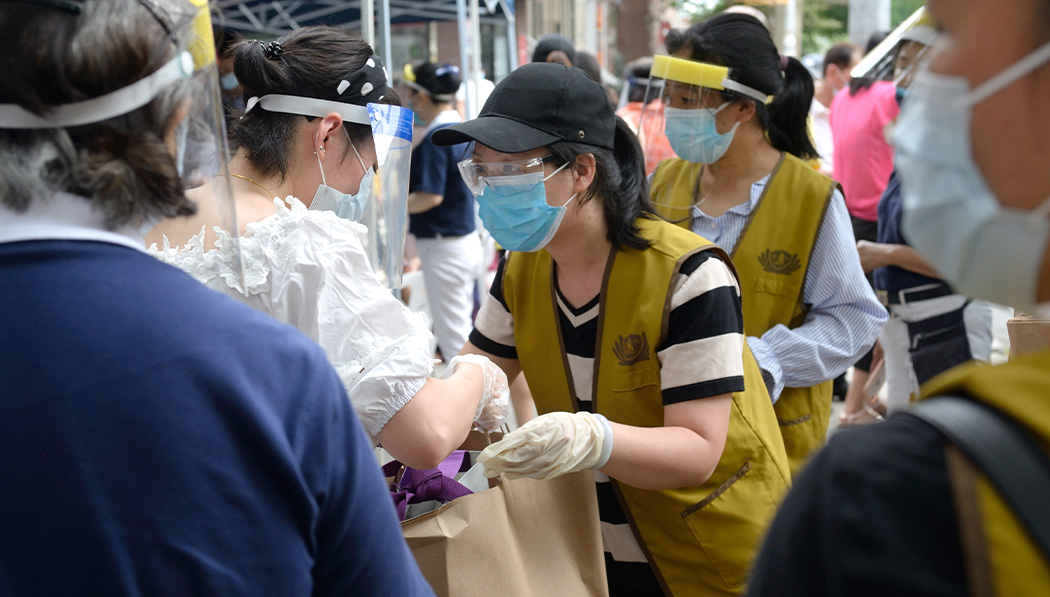
While New York City grappled with the first and most deadly waves of COVID-19, Tzu Chi volunteers across the Northeast Region began distributing vegetarian grocery packages and PPE to communities in need. Care recipients in New York included seniors in Manhattan’s Chinatown, Chinese-speaking immigrants in Brooklyn, plus recently arrived immigrants in Long Island, while in Massachusetts, residents at the Tai Tung Village apartments in Boston, and Cambodian community members in Lowell. Other recipient institutions included the Suffolk County Police Department and the NewYork-Presbyterian Queens Hospital. Tzu Chi USA’s Northeast Region also developed crucial partnerships with CAIPA (Coalition of Asian-American Independent Practice Association), health insurance provider Healthfirst, the Chinese-American Dental Association, the New York State Office of Emergency Management, and Brigada de Esperanza to extend their reach.
Mid-Atlantic Region
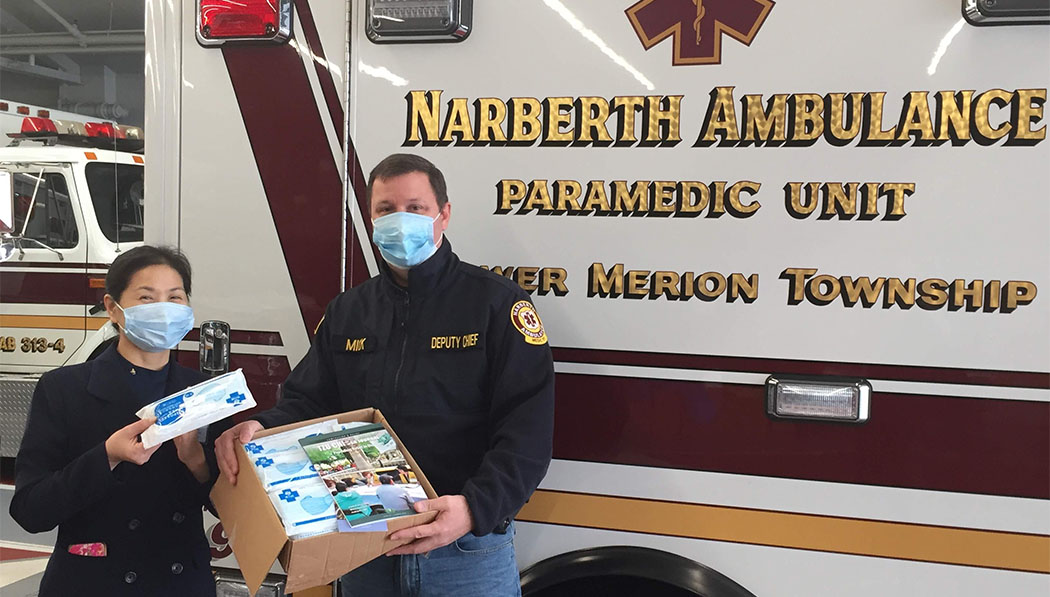
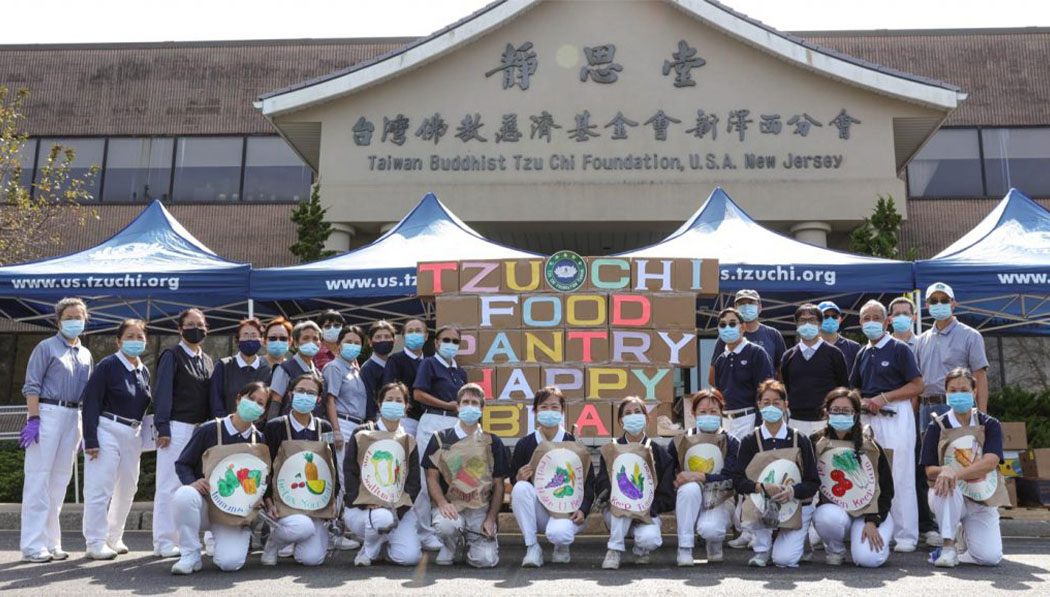
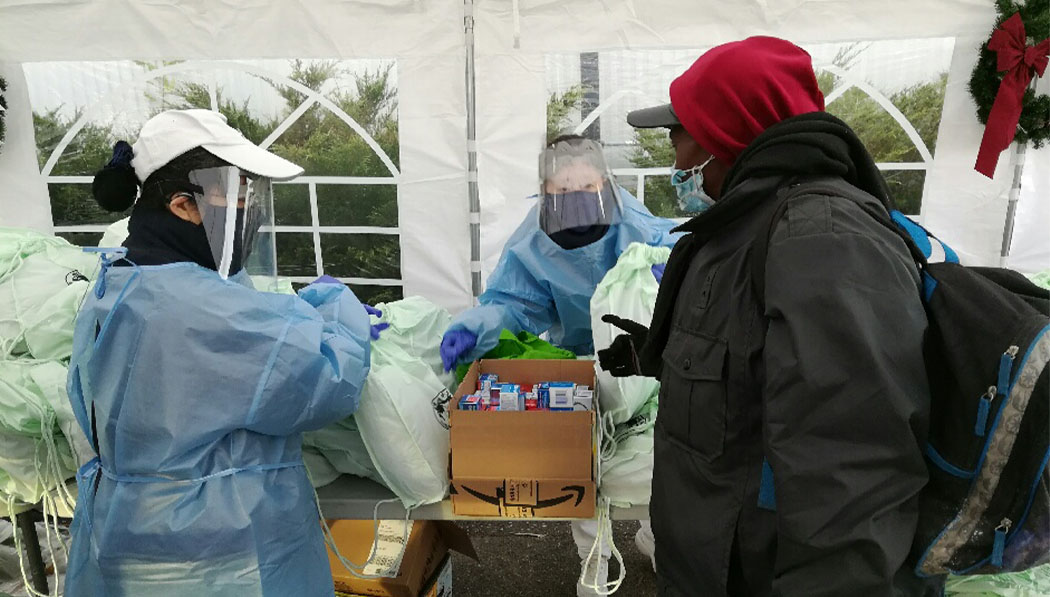
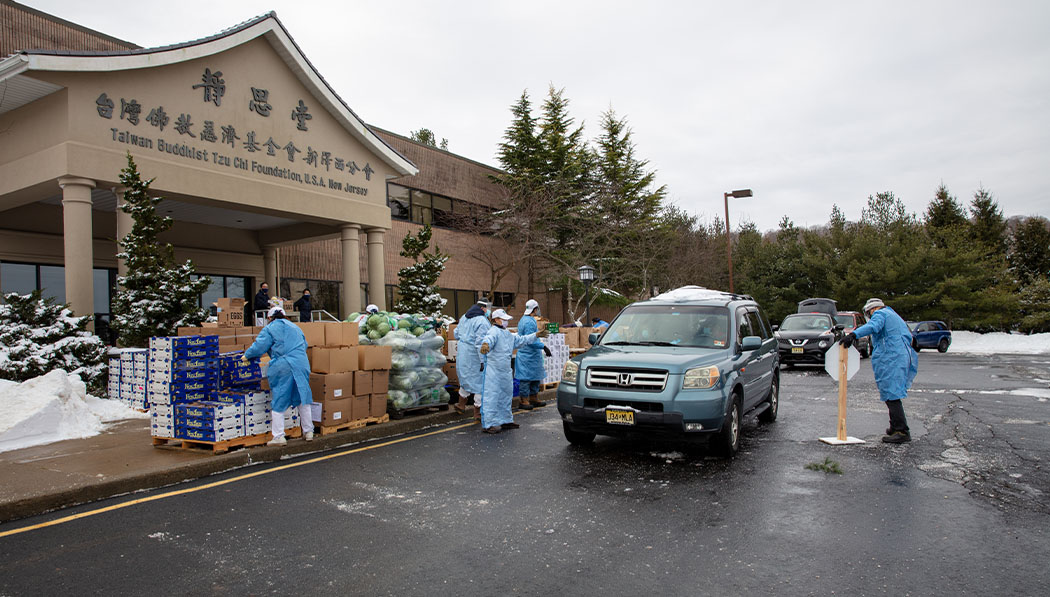
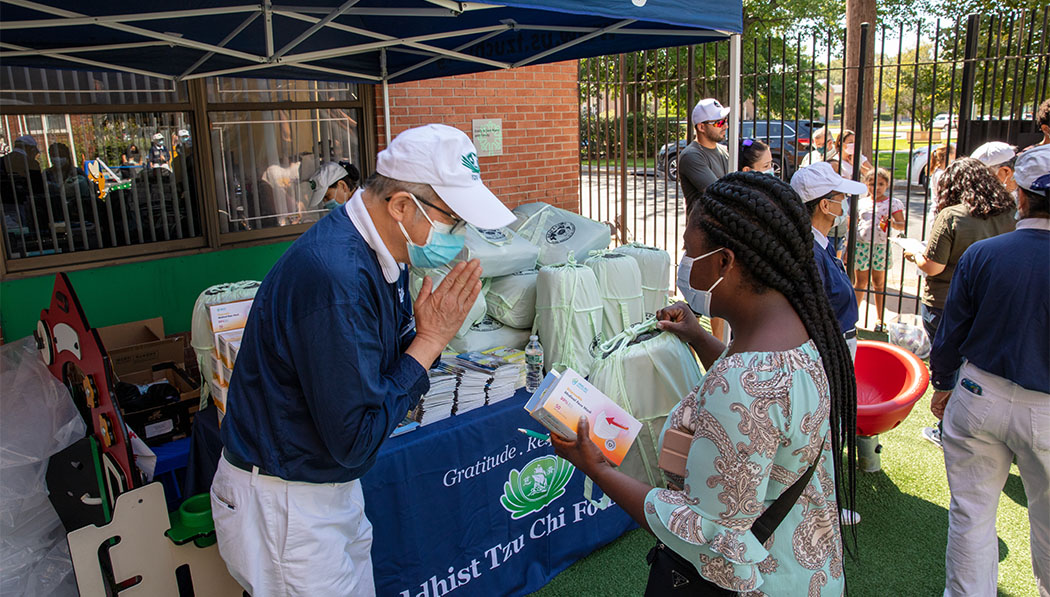
The Mid-Atlantic Region Office in Cedar Grove, New Jersey, resumed regular food pantry services in May 2020 and provided thousands of pounds of fresh produce and dry goods for households in need while transitioning procedures to a drive-thru format to minimize contact at pickup. At the start of 2021, volunteers also distributed winter care and personal hygiene items to hot meal recipients at Cathedral Kitchen in Cherry Hill, New Jersey. At the Philadelphia Service Center in Pennsylvania, in addition to PPE distributions, volunteers resumed their annual Volunteer Income Tax Assistance (VITA) program, transitioning to online appointments and limited in-person sessions to help qualifying individuals fill out their 2020 income tax returns. Around the same time, PIttsburgh Service Center volunteers also provided support at a local vaccination event, which aimed to boost inoculation rates among Chinese-speaking restaurant workers in the community.
Greater Washington DC Region
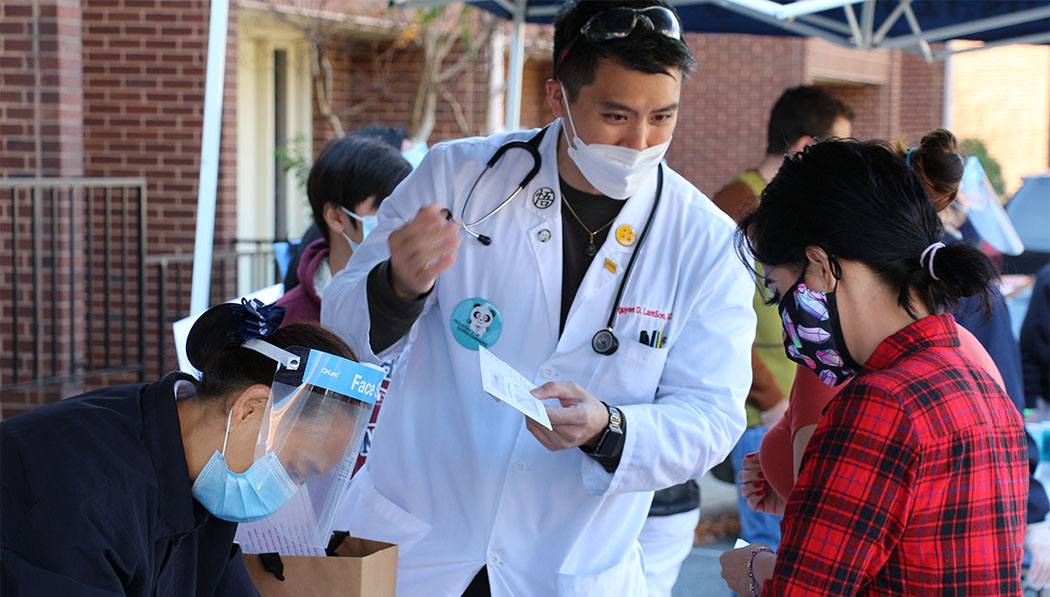
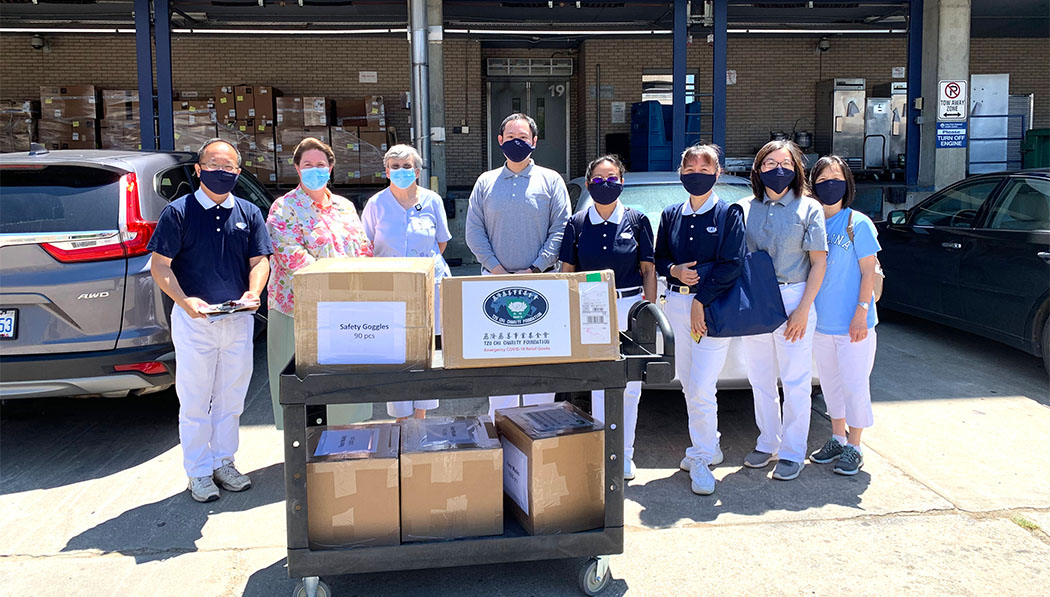
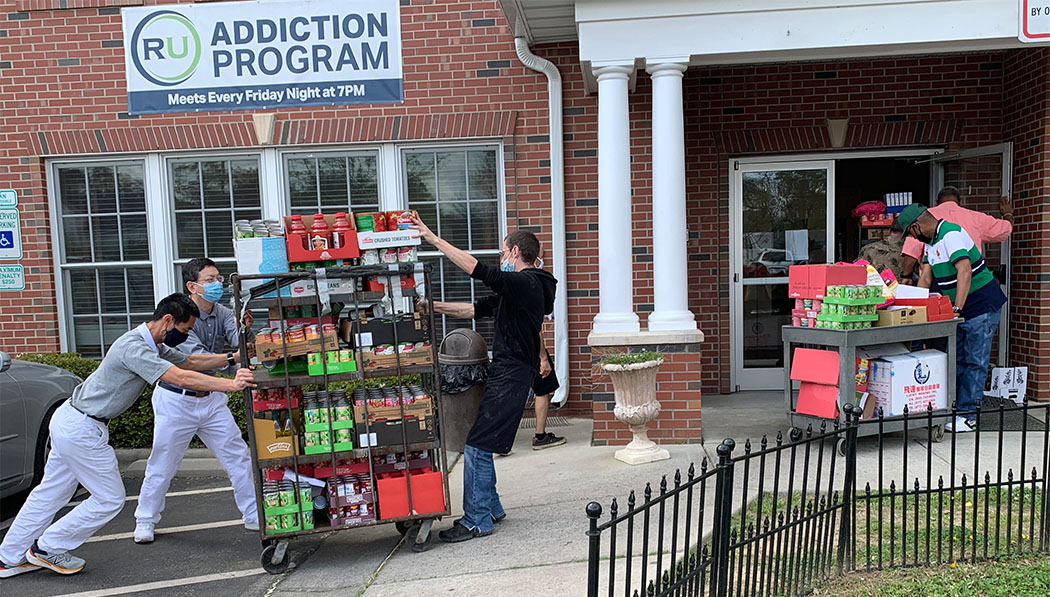
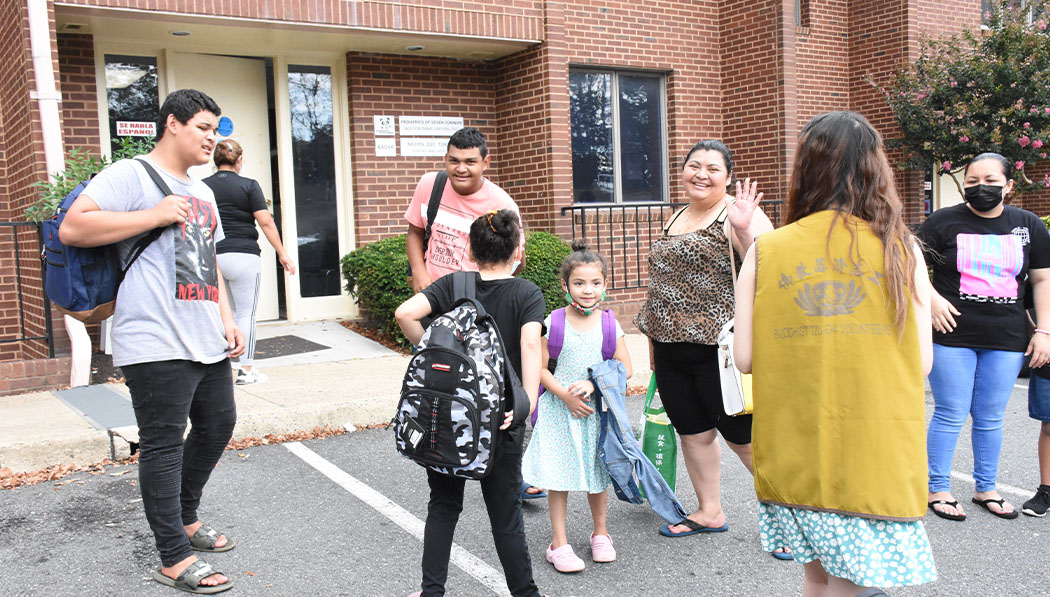
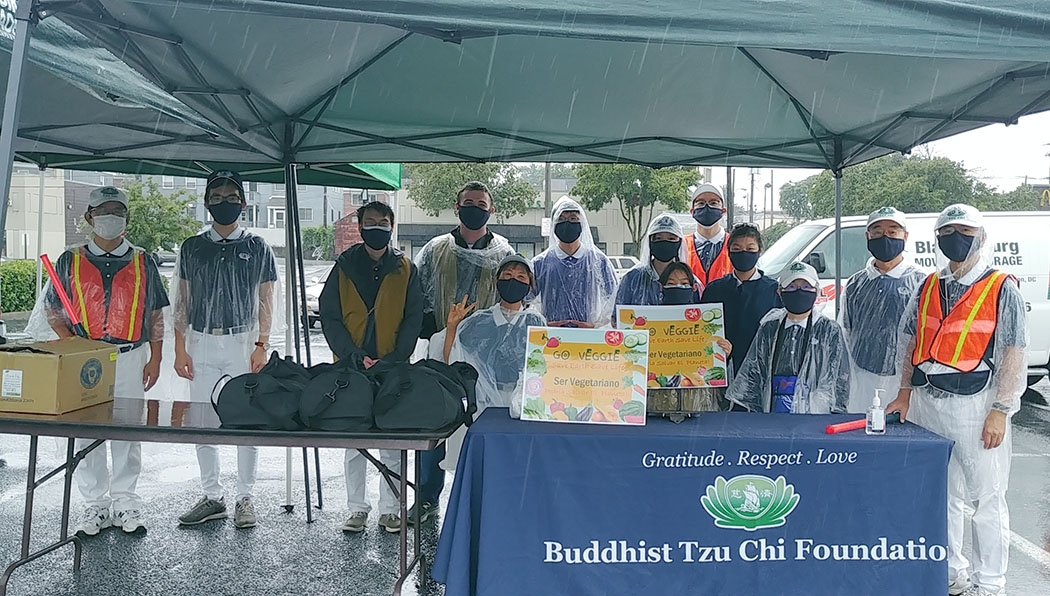
Across the Greater Washington DC Region, volunteers brought PPE to institutions including Johns Hopkins Hospital and the University of Maryland Medical System in Maryland, as well as East Carolina University Physicians and High Point Medical Center in North Carolina, among others. Later, volunteers launched drive-thru grocery distributions at their regional office in Reston, Virginia, and administered outdoor flu shots in the fall of 2020. Crucial partnerships were formed with the Fairfax County Health Department, Dr. LamSon Nguyen of Pediatrics of Seven Corners, JoAnn Leleck Elementary and Rosa L. Parks Elementary Schools, and Adventist Community Services of Greater Washington (who collaborated with Tzu Chi to serve Ethiopian immigrants in Maryland). In a similar effort, Raleigh Service Center volunteers raised funds to purchase more than 1,500 lbs. of canned food and cooking oil for distribution at the Durham Rescue Mission in Durham, North Carolina.
Southern Region
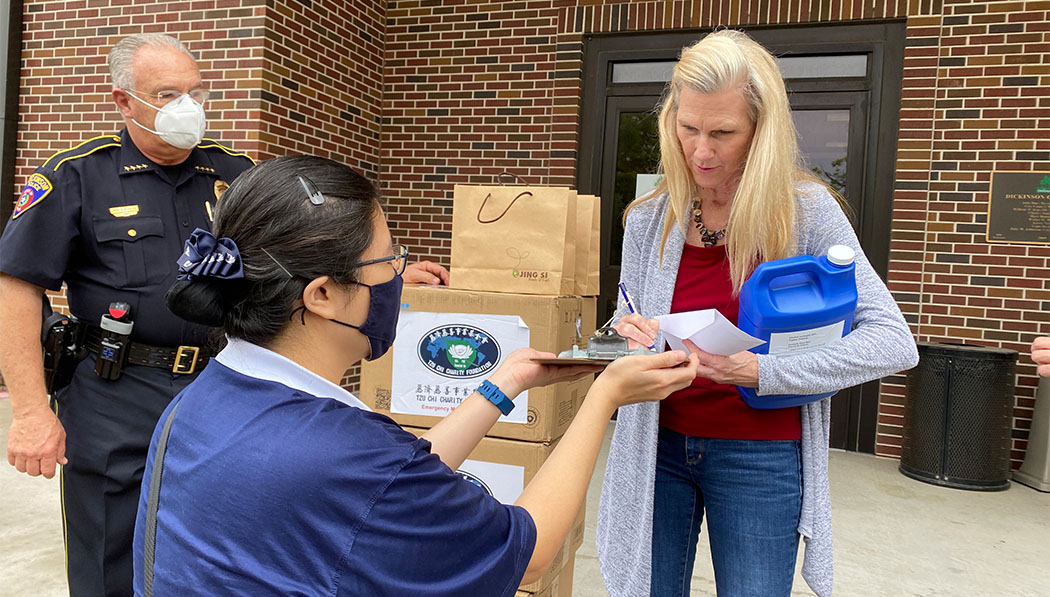
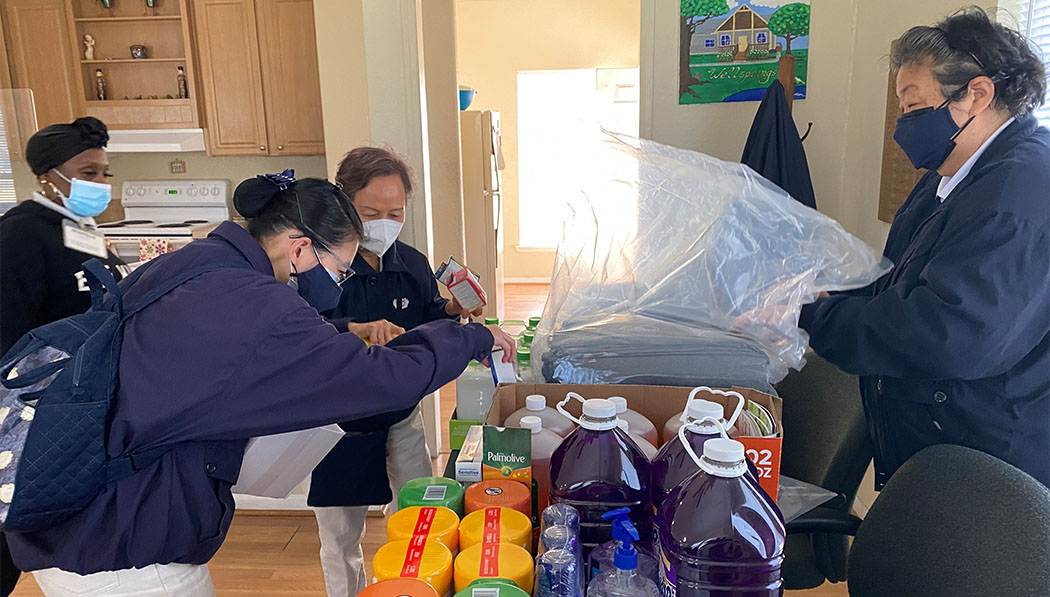
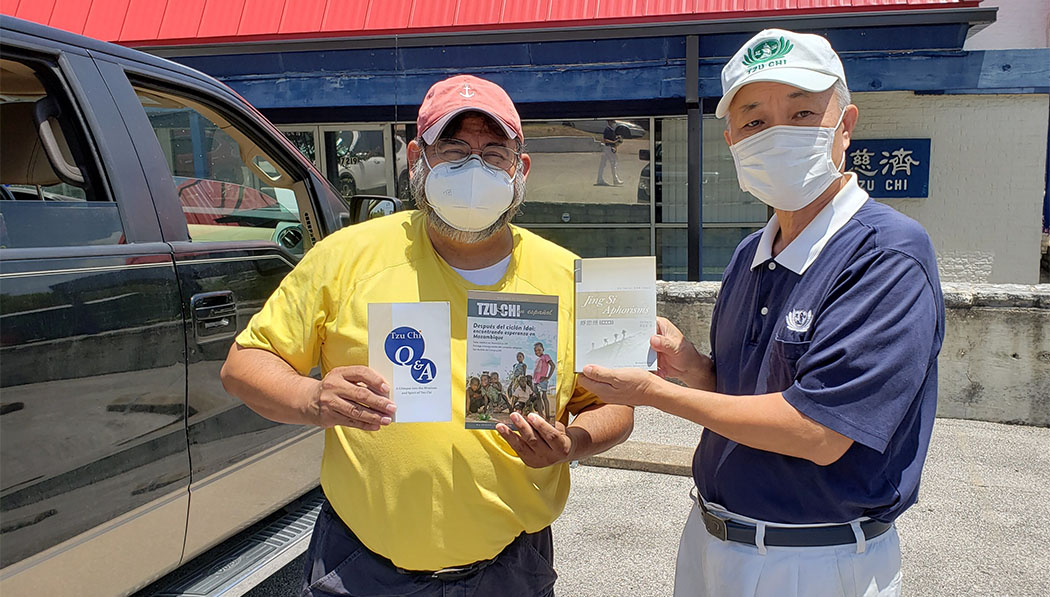
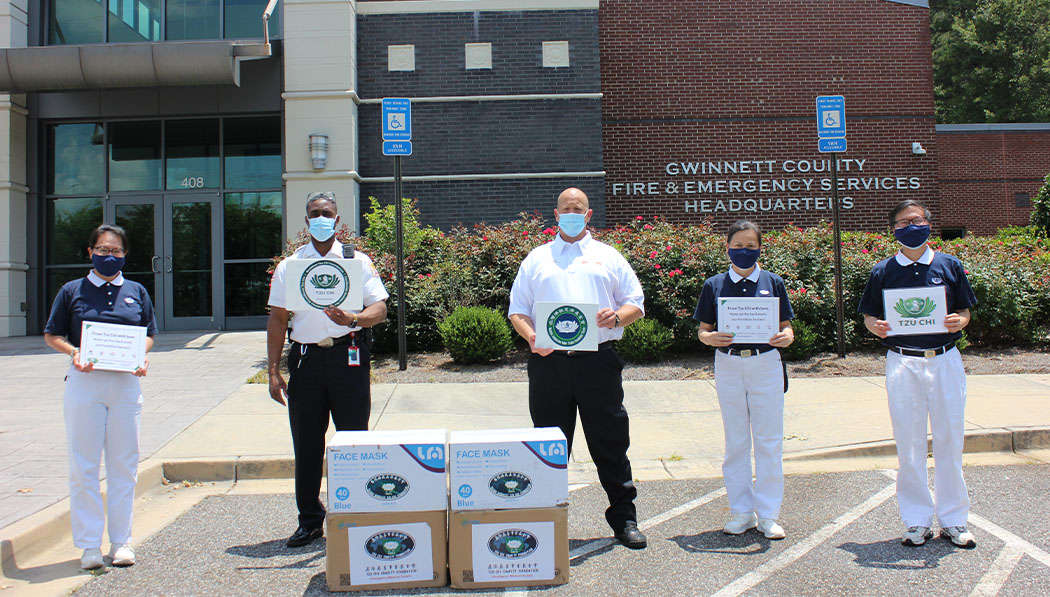
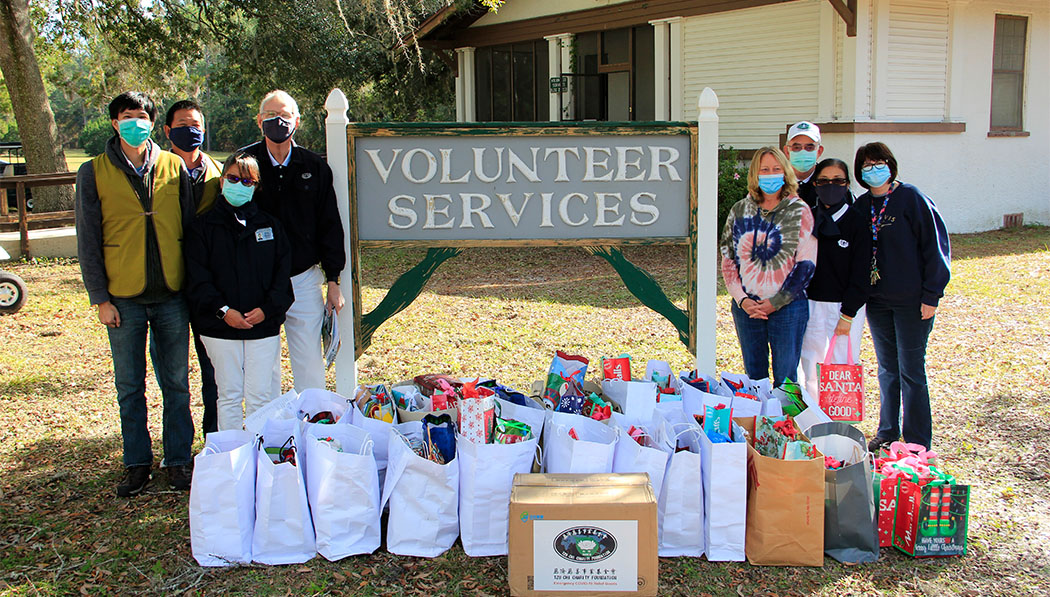
In the Southern Region, volunteers donated PPE across the American South to places such as in Texas, the City of Austin plus small businesses at its Chinatown Center, and St. Joseph Medical Center in Houston; in Florida, the Memorial Hospital Pembroke in Pembroke Pines and the Tacachale Developmental Disability Center in Gainesville (located more than 100 miles from the Tzu Chi USA Orlando Service Center); and at Children’s Healthcare of Atlanta – Scottish Rite Hospital and Northside Hospital Duluth in Georgia. Grocery distributions, to offset the financial impacts of the pandemic, also kicked off with help from the Houston Food Bank at the Southern Region Office in Houston, Texas. Partnerships were also formed with the American Red Cross (Texas Gulf Coast Region), Houseless Organizing Coalition, League of United Latin American Citizens, and Hispanic Contractors Association de Tejas. Populations including those struggling with permanent housing (like those at the Jubilee Center of South Broward in Hollywood, Florida), inmates at the Harris County Sheriff’s Office in Houston, immigrant communities (like in Houston’s Little Cambodia), as well as seniors (at facilities like the Cai Hong Senior Center in Norcross, Georgia) received extra love and care.
Central Region
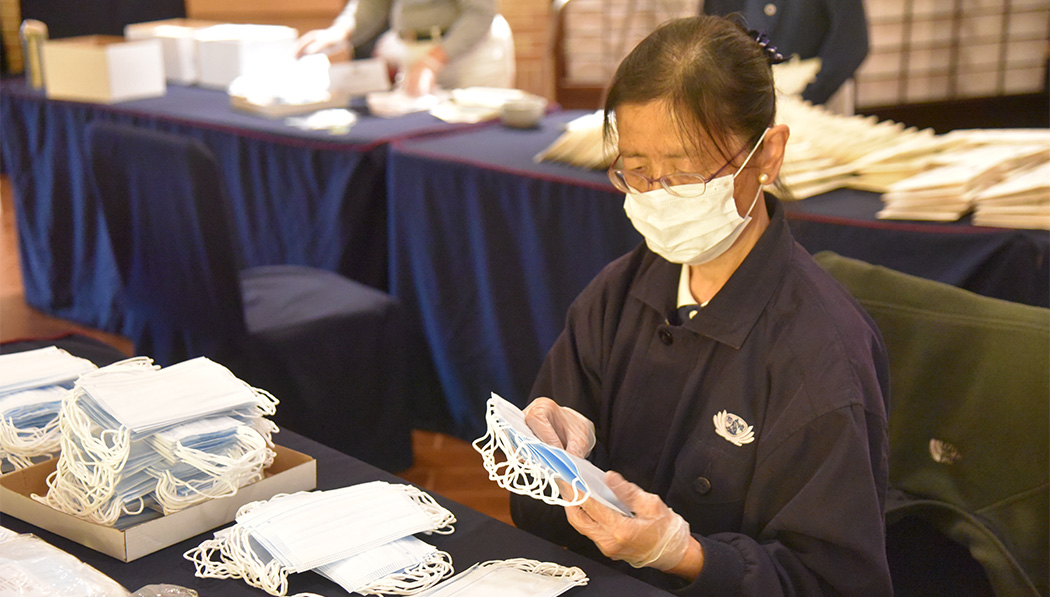
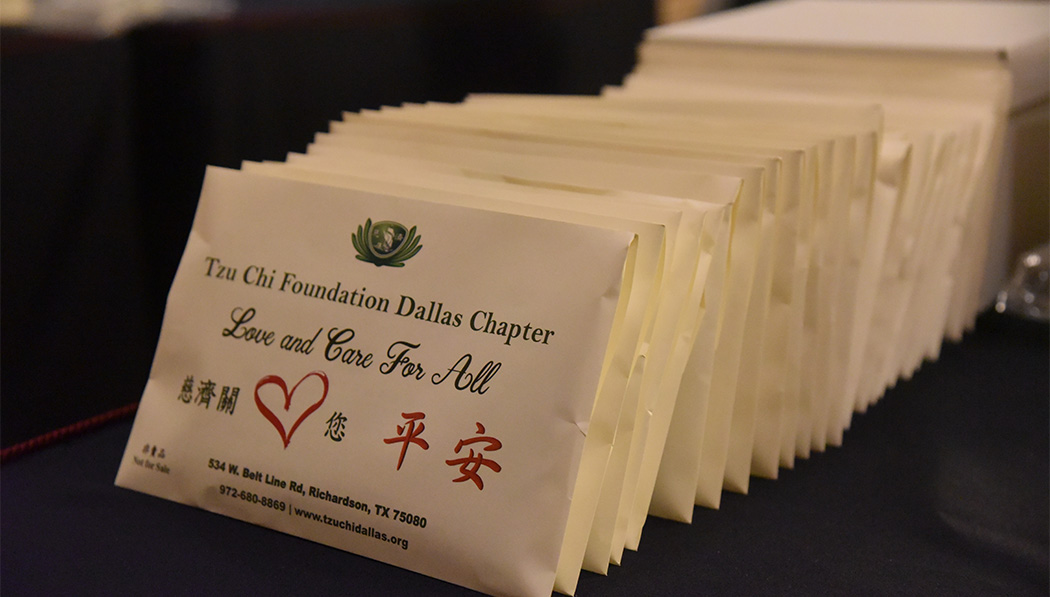
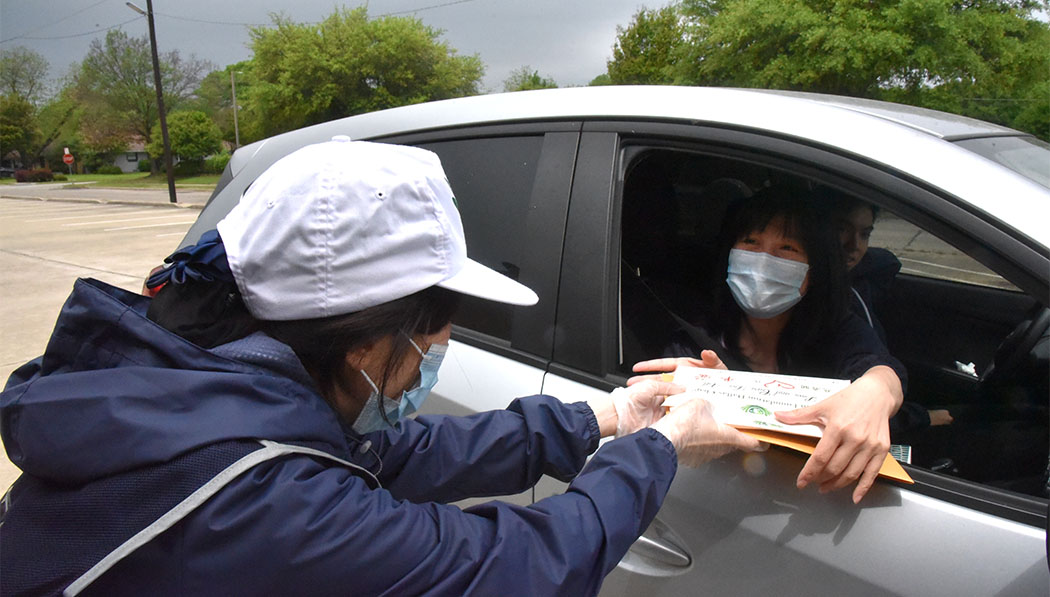
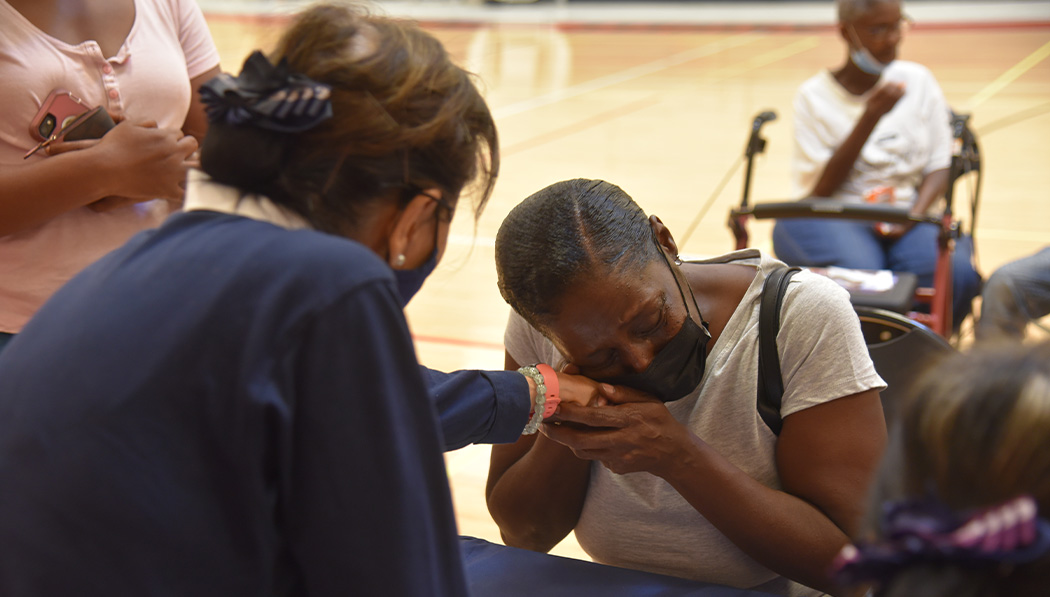
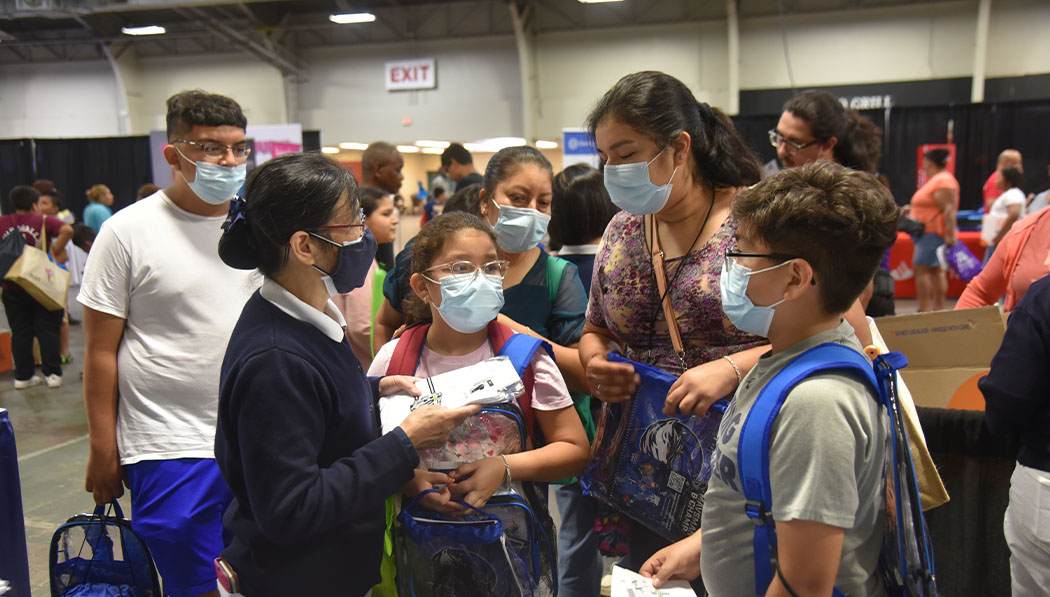
Slightly more inland in Dallas, the home of Tzu Chi USA’s Central Region Office, volunteers sprung into action in the early days of the pandemic. In March 2020, they prepared and donated eco-blankets for those experiencing homelessness in Dallas, who were being encouraged to take precautionary shelter at the time at the Kay Bailey Hutchison Convention Center. Volunteers also gathered in masks on April 10, 2020 to prepare packages of PPE for distribution to local residents, including the families of students at Tzu Chi Great Love Preschool and Kindergarten and Tzu Chi Academy. Donations of PPE were also prepared for institutions like Medical City Dallas Hospital. Tzu Chi Central volunteers also worked closely with partners at the City of Dallas Office of Emergency Management. After a two-year pause, they also resumed their annual school uniform distribution via the Dallas Mayor’s Back to School Fair in 2022, which, this time, included donations of PPE for each family.
Midwest Region
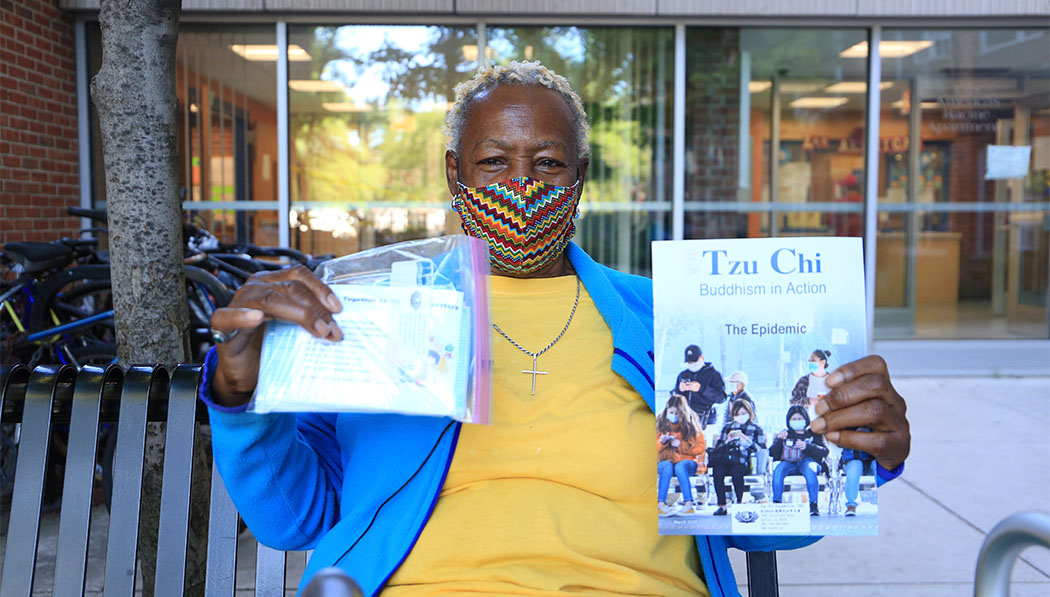
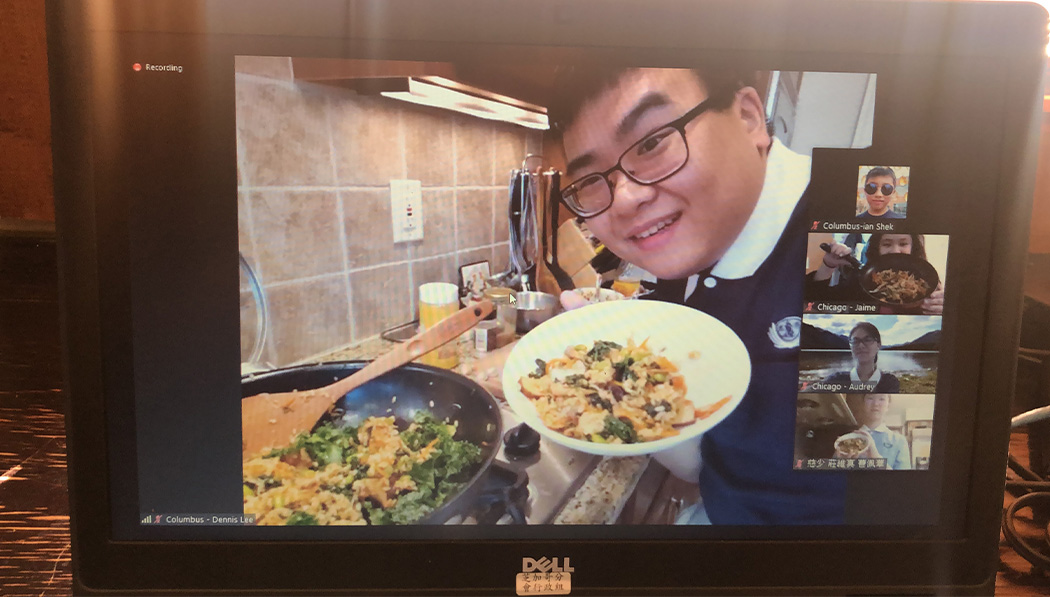
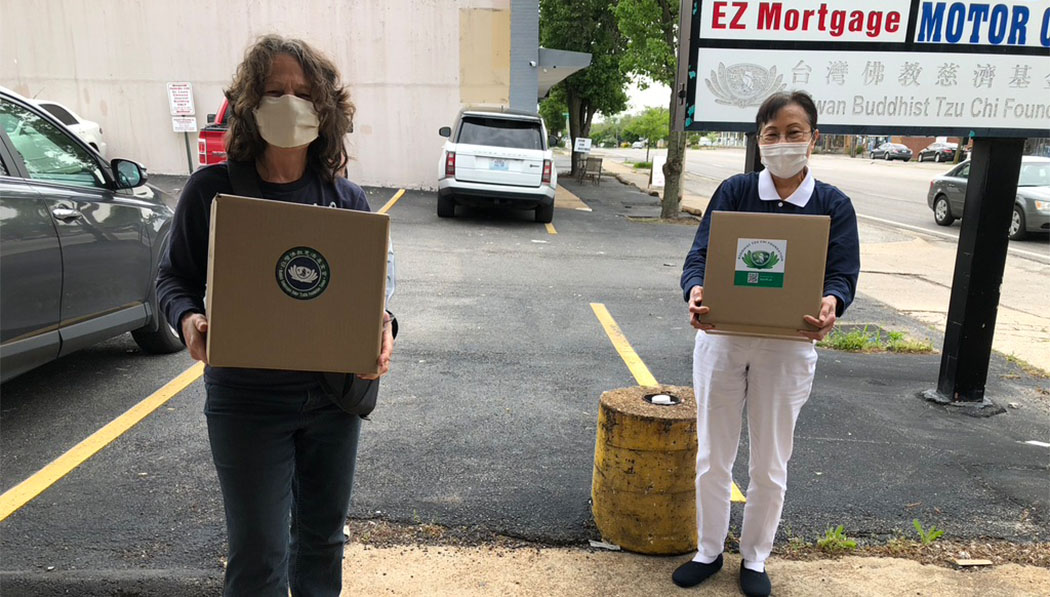
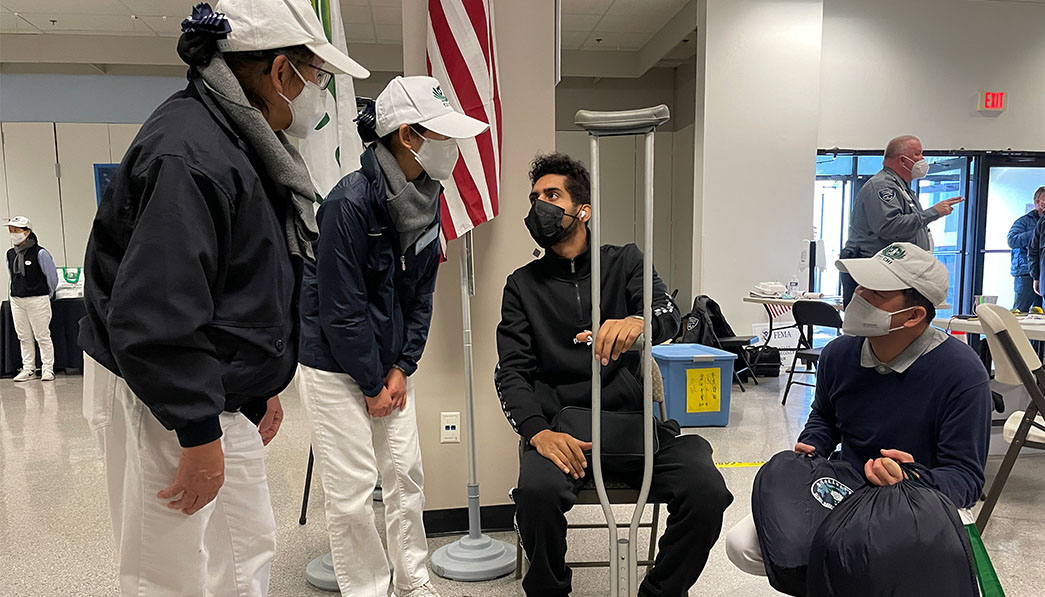
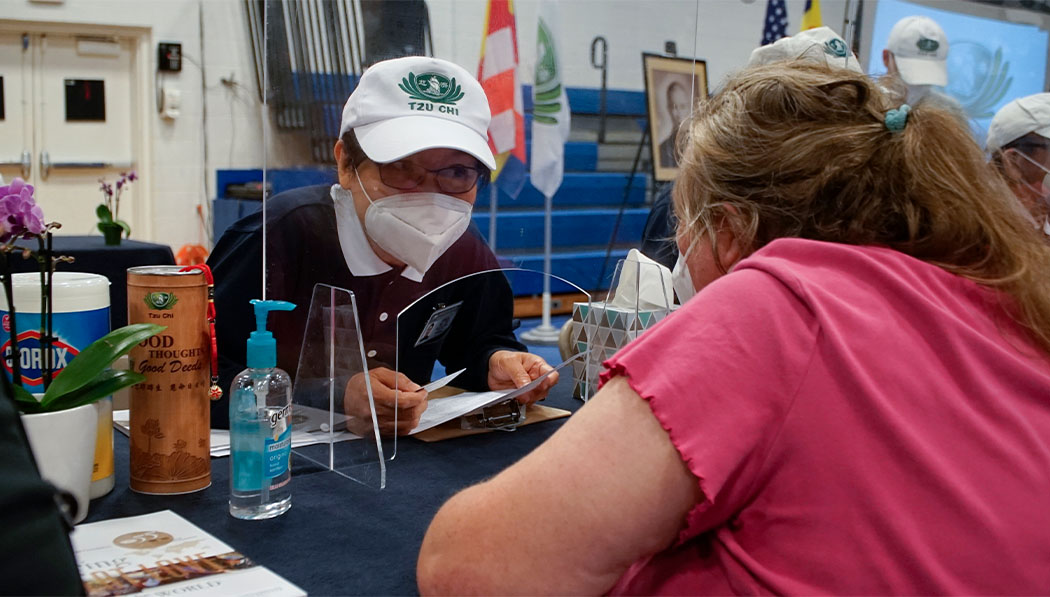
Despite shortages of PPE as early as the spring of 2020, the Midwest Region Office’s care didn’t waver as its volunteers donated personal hygiene kits and blankets for those without permanent housing at the behest of Illinois’ McHenry County Government. Tzu Chi Milwaukee volunteers also brought donations of rice to those sheltering at the MacCanon Brown Homeless Sanctuary in Wisconsin. Midwest volunteers also teamed up with organizations like the Stone Creek Church to serve an economically struggling community with groceries in Rantoul, Illionois. They also brought PPE and care packages to vulnerable communities like older adults in Chicago’s Ward 25 and nursing home residents at Little Sisters of the Poor, St. Mary’s Home in IL, as well as the Sisters of the Good Shepherd in MO. Healthcare institutions like Mount Sinai Hospital Medical Center were also one of many to receive PPE donations at the height of the pandemic. But, at the end of 2021, new crises began to emerge after destructive tornadoes wreaked havoc across the American Midwest. Volunteers from multiple states banded together to host emergency distributions while also supplying PPE. Soon after, floods in Eastern Kentucky in the summer of 2022 would spur another disaster relief mission, which included the provision of PPE and school uniforms for students. Medical outreach services also resumed at the Chicago Chinatown Service Center in May 2022.
Northwest Region
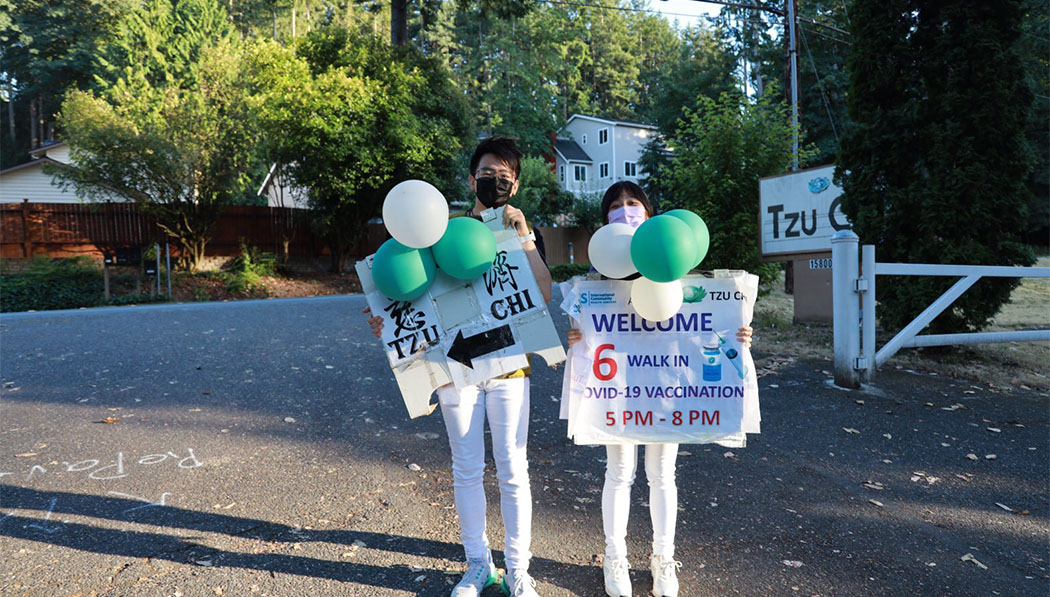
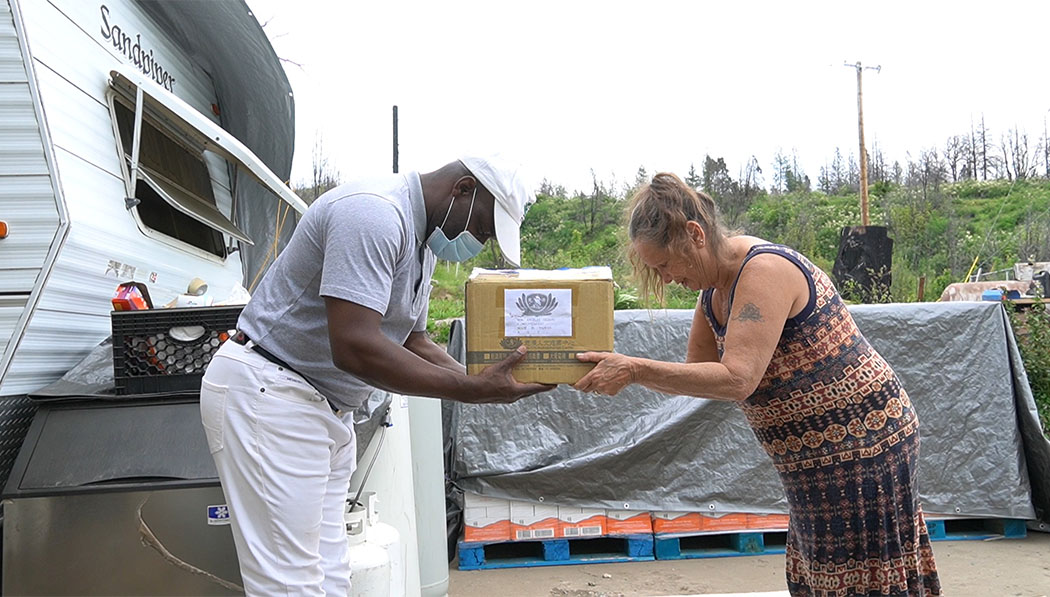
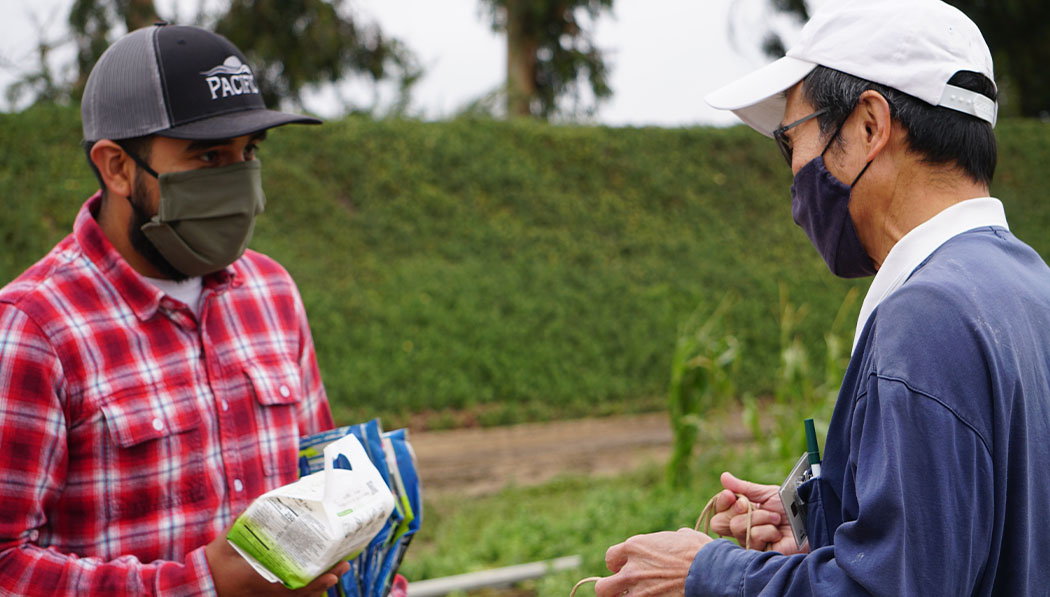
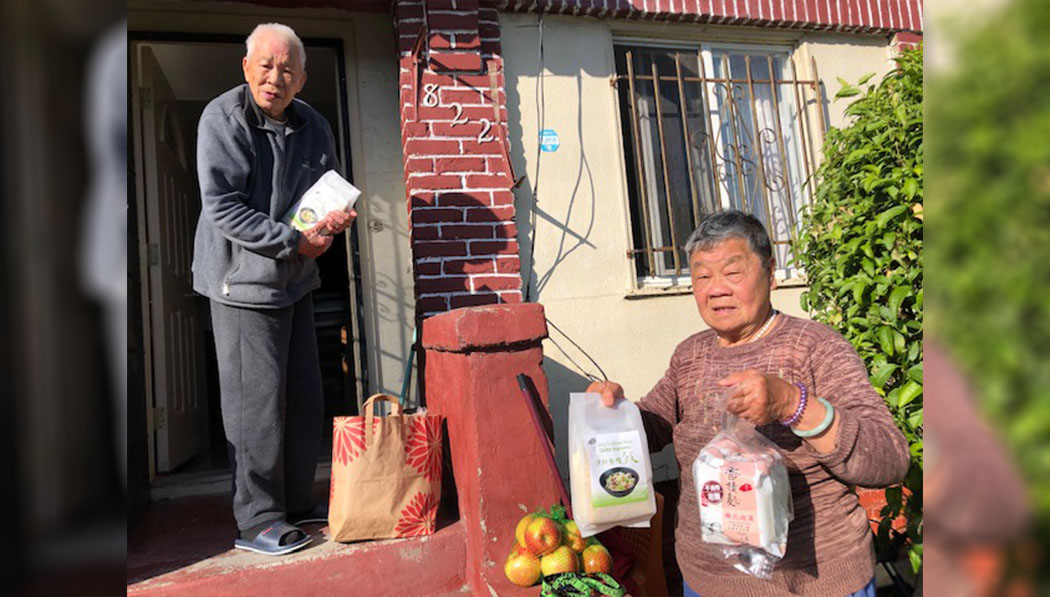
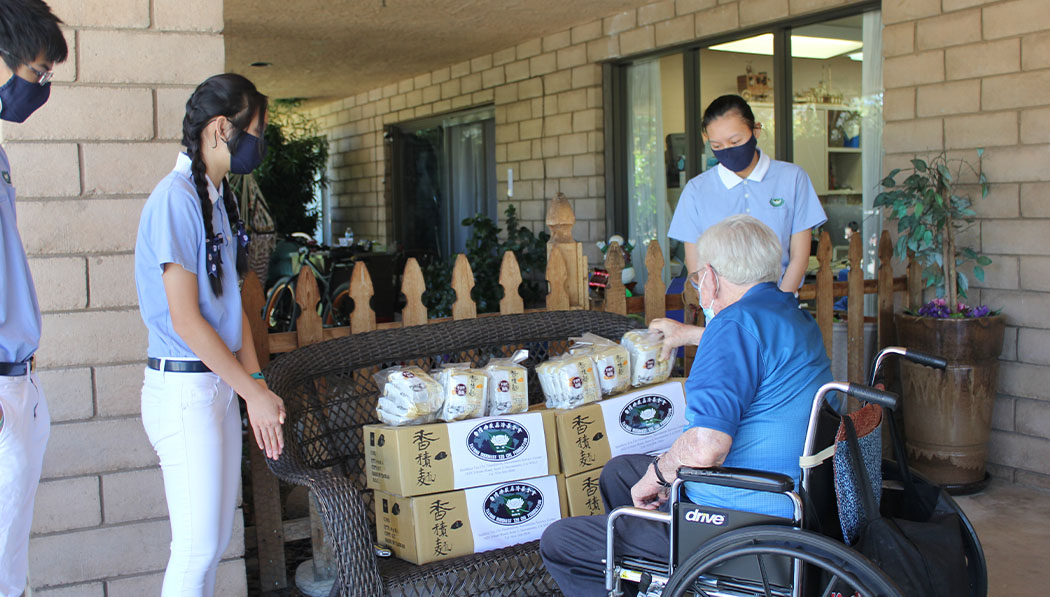
In San Jose, California, home of the Northwest Region Office, volunteers created the NorCal PPE Project Team to distribute PPE across Northern California. In addition to healthcare institutions (like the UC Davis Medical Center in Sacramento and Valley Medical Center in Santa Clara), volunteers especially focused their donations toward residents in rural California like at the City of Watsonville, Rancho Cielo Youth Campus, and the Food Bank of Monterey County (to name a few). At home, volunteers with sewing machines stitched more than 1,000 cloth face masks for distribution; others helped Dr. Hien Nguyen assemble a new invention, the HienT particulate barrier, which could protect medical workers with direct exposure to COVID-positive patients. Further north, volunteers at the Seattle Branch co-hosted multiple vaccination events, too, with International Community Health Services. Youth volunteers there also took the lead with initiatives like a donation of more than 16,500 pieces of PPE to agricultural workers in rural Washington.
National Headquarters Region
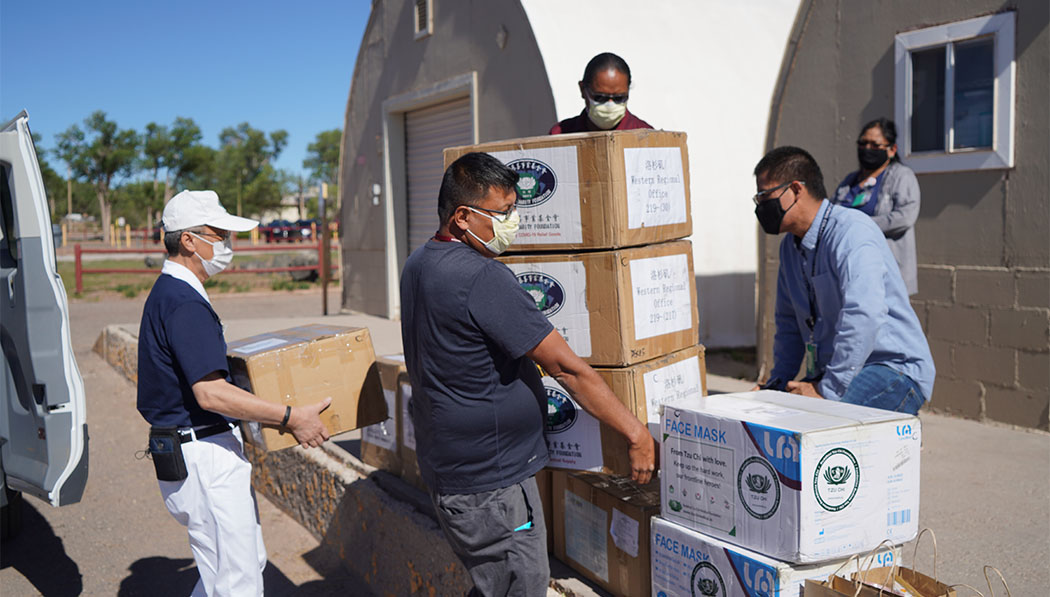
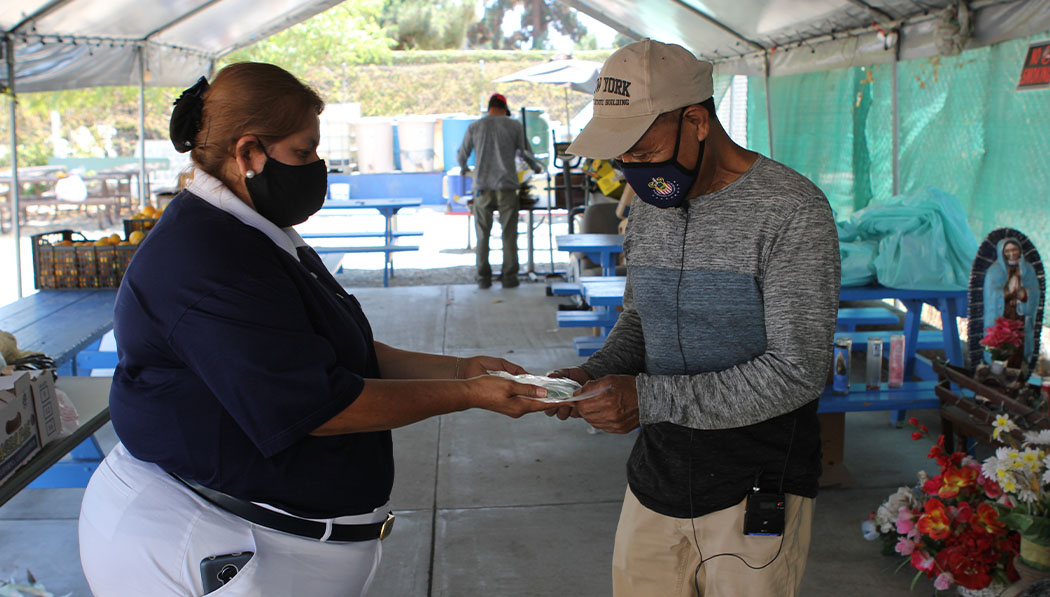
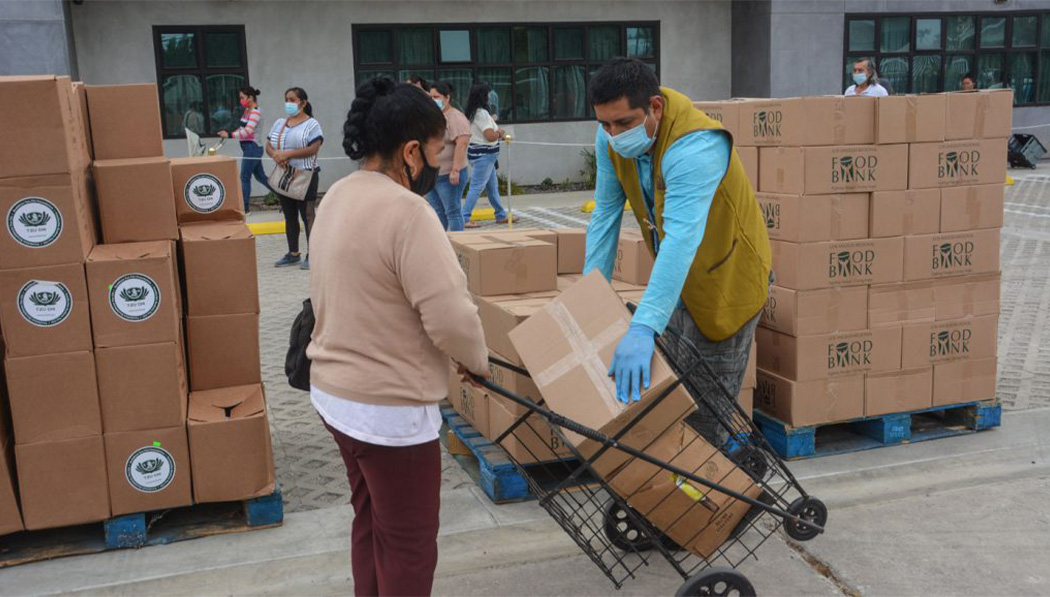
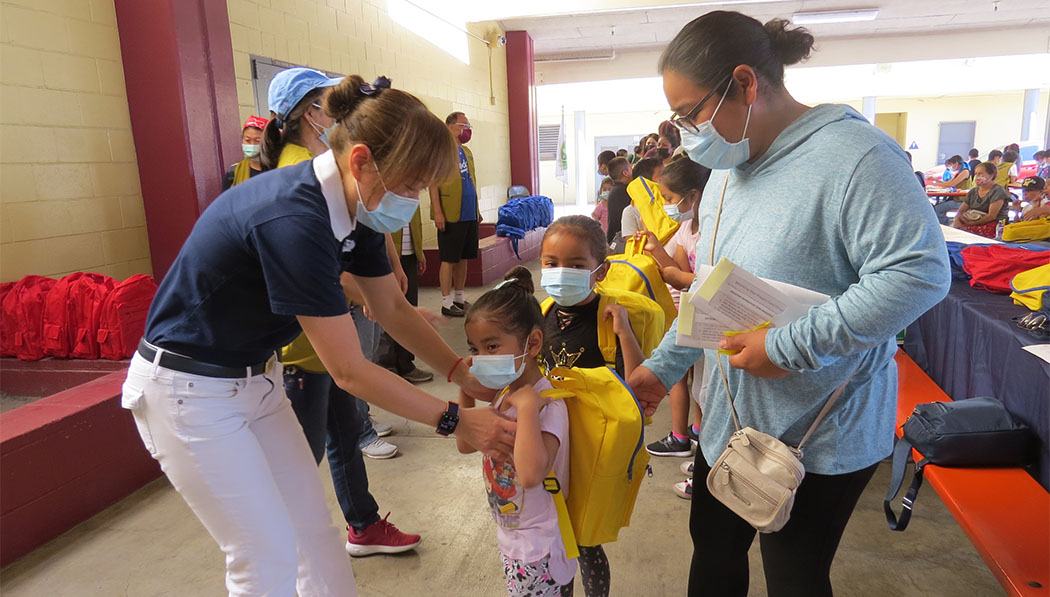
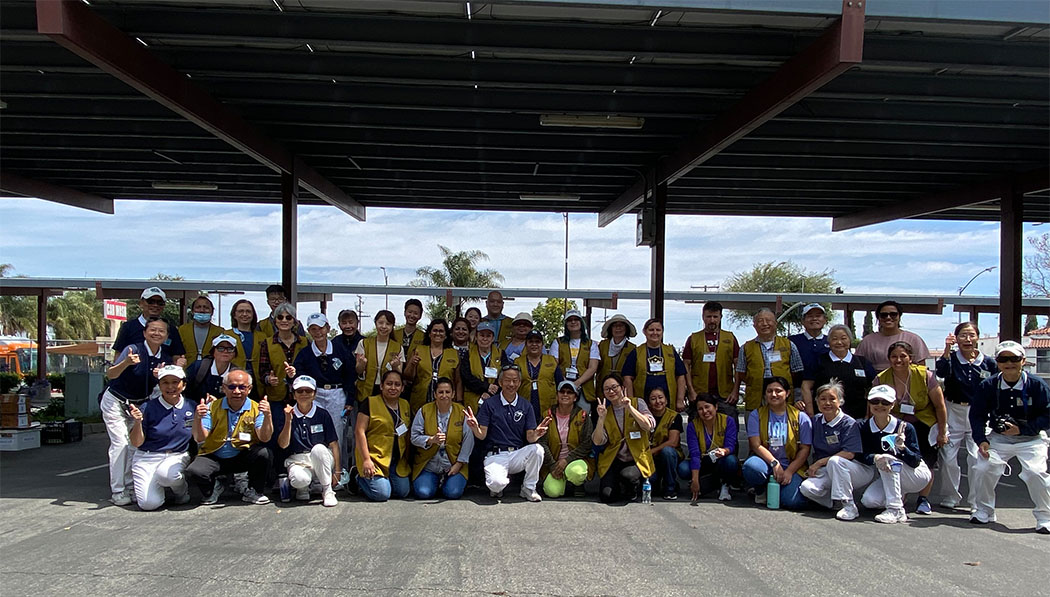
Concurrent with PPE distributions across Southern California, National Headquarters Region volunteers hosted weekly food distributions in multiple locations to help households alleviate the financial impacts of the pandemic. The volunteers also hosted an antibody testing event in conjunction with Medical Task Force International in San Dimas, California, in July 2020, to help people determine if they had indeed been formerly infected with the virus. Across the region, the Las Vegas and Phoenix Service Centers also pitched in to PPE efforts, with the former making donations to institutions like the Lung Center Of Nevada and the North Rainbow myGeneration Senior Clinic, whilst the latter ensured young people at the University of Arizona could also protect themselves. Most poignantly though was Phoenix volunteers’ care for the indigenous people of the Navajo Nation and Hopi Reservation. In collaboration with members of the Bahá’í Faith and the Navajo & Hopi Families COVID-19 Relief Fund, together they sought to reduce high rates of infection among indigenous peoples in Arizona and New Mexico with PPE donations and food, too.
Pacific Islands Region
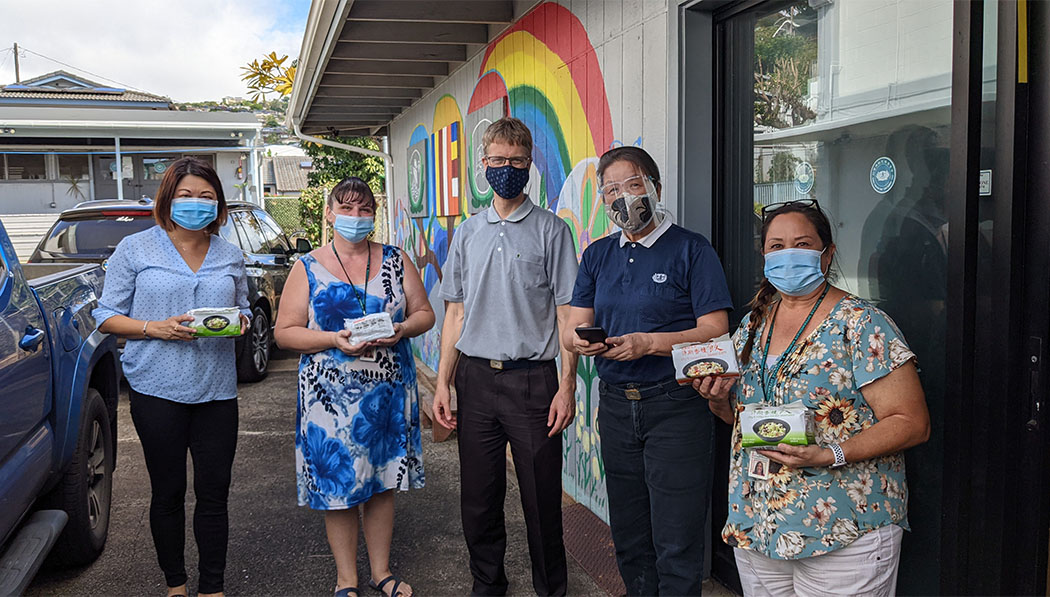
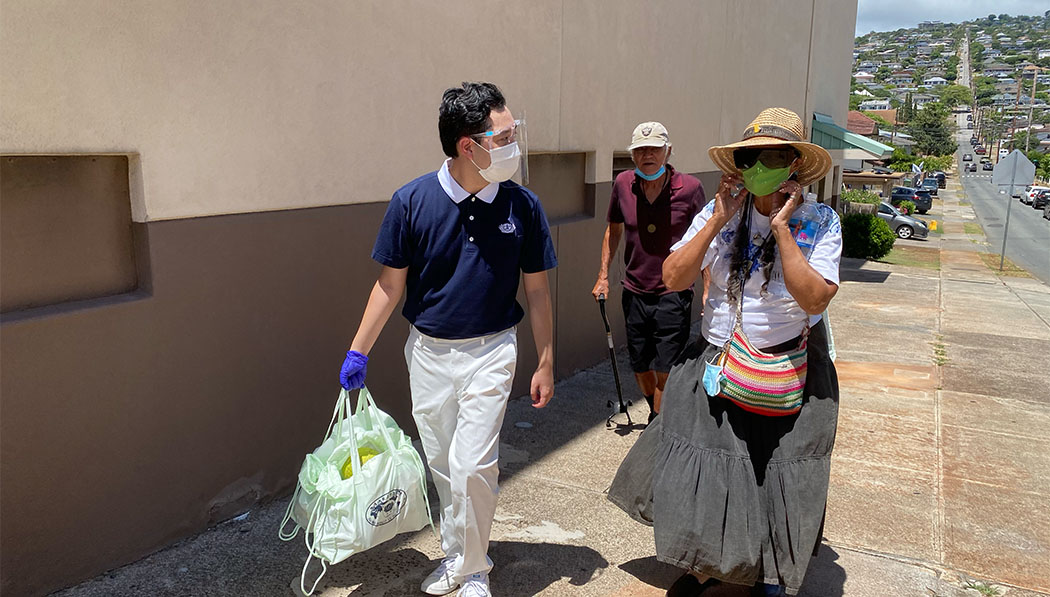
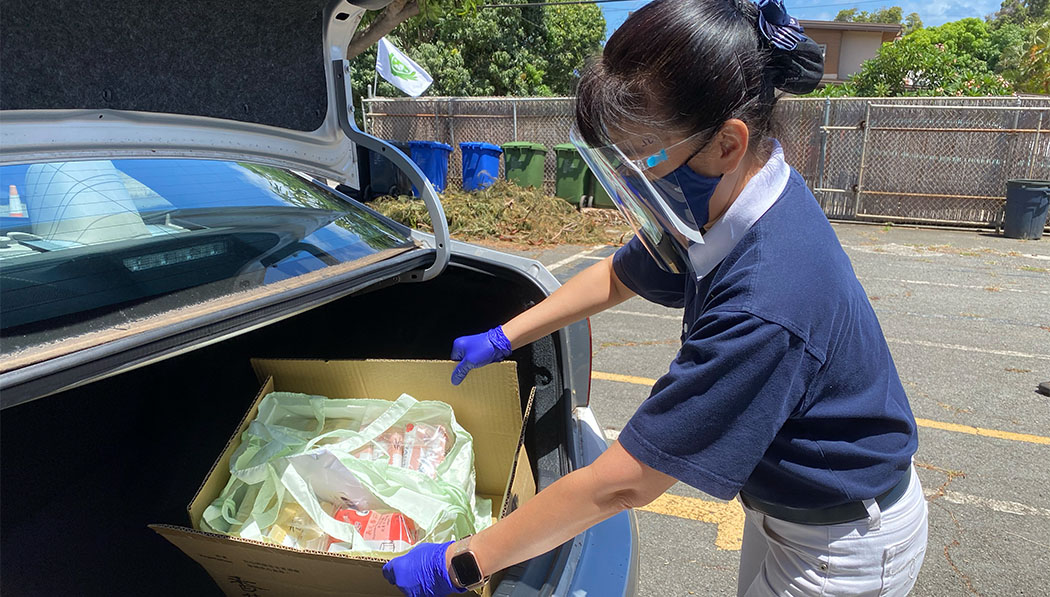
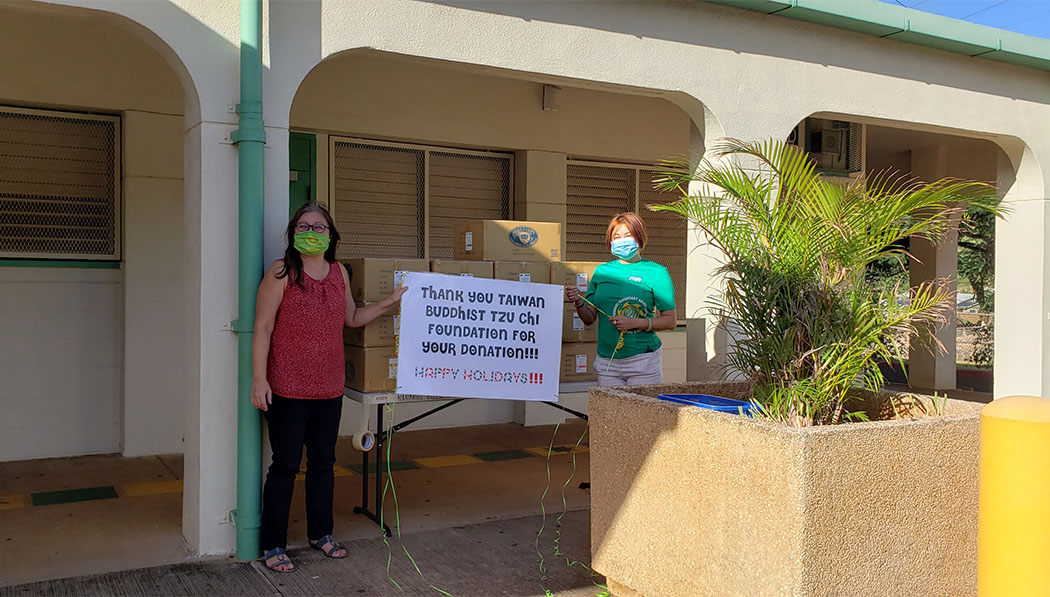
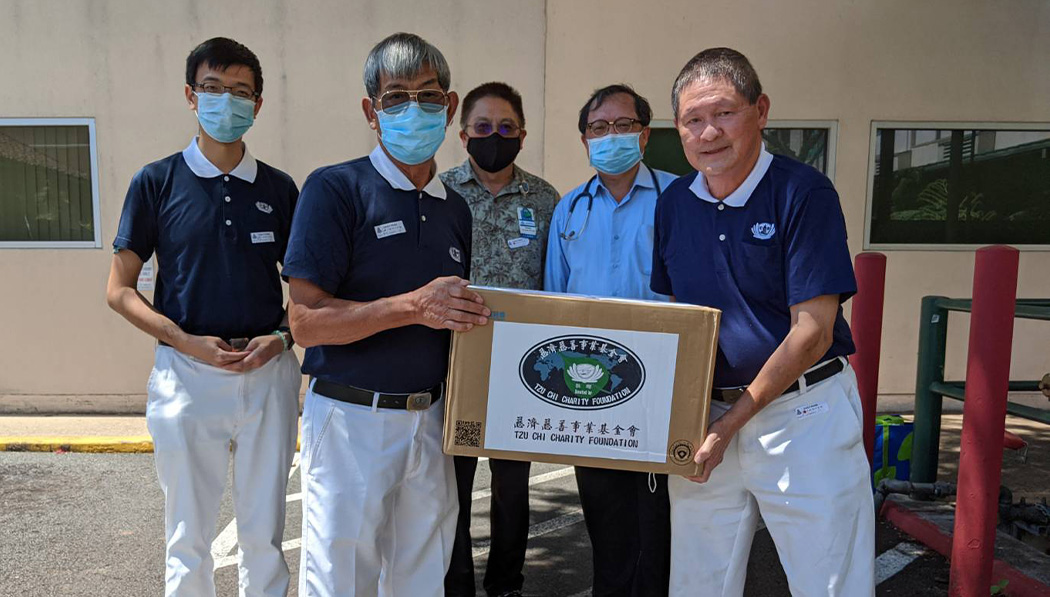
While relatively isolated from COVID surges on the mainland, the virus remained a threat across the Hawaiian Islands. Pacific Islands Region volunteers were able to provide PPE donations to institutions like the Hawaiʻi Behavioral Health & Homelessness Statewide Unified Response Group and Hawaii’s Behavioral Health Services Administration. To alleviate economic struggles, in December 2020, Pacific Islands Region volunteers distributed a total of 23,000 packs of Jing Si Instant Rice and noodles to those without permanent housing on the island of Oahu. Among this group were 13 non-profit organizations in Hawaii, including the Salvation Army, Hawaii Meals on Wheels, and local food banks, but also Nānākuli-Wai‘anae Complex Schools, who indicated that approximately 600 of their students were experiencing homelessness, whether living in tents, their vehicles, or with another family.
A Handmade Solution
As these activities continued, other Tzu Chi volunteers showed their ingenuity and problem-solving abilities by making cloth masks and even caps at home. Like so many people at this time, many felt helpless while also spending an abundance of time at home. In both the San Francisco Bay Area and near Washington DC, Tzu Chi volunteers who could sew began to prepare masks to donate to children and adults through their local Tzu Chi offices. The thinking was this: if sewing volunteers could help lessen the general public’s demand for PPE, this would ease access to more effective PPE for those on the frontlines of COVID-19.
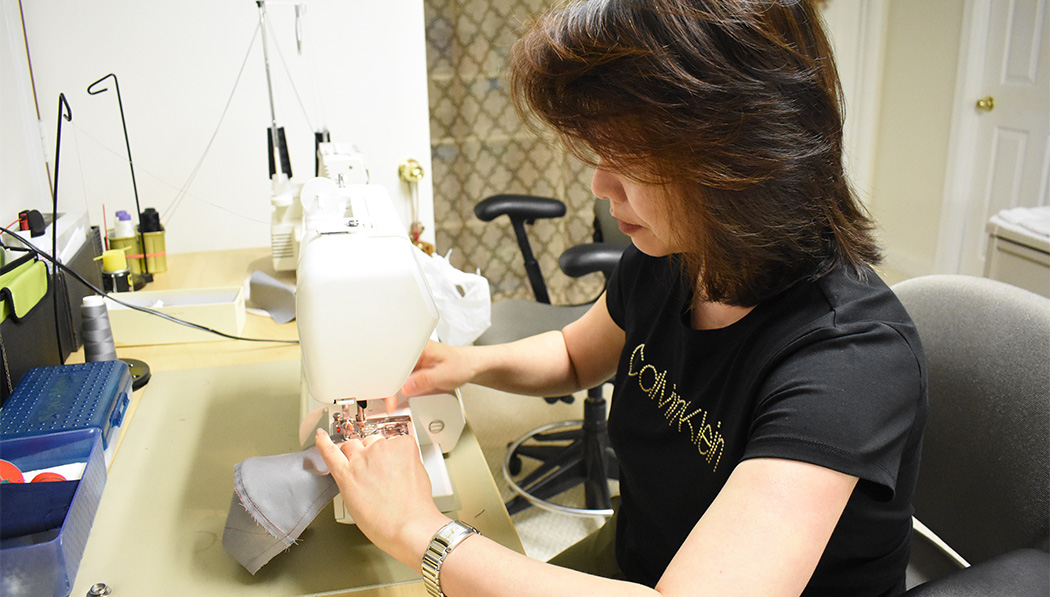
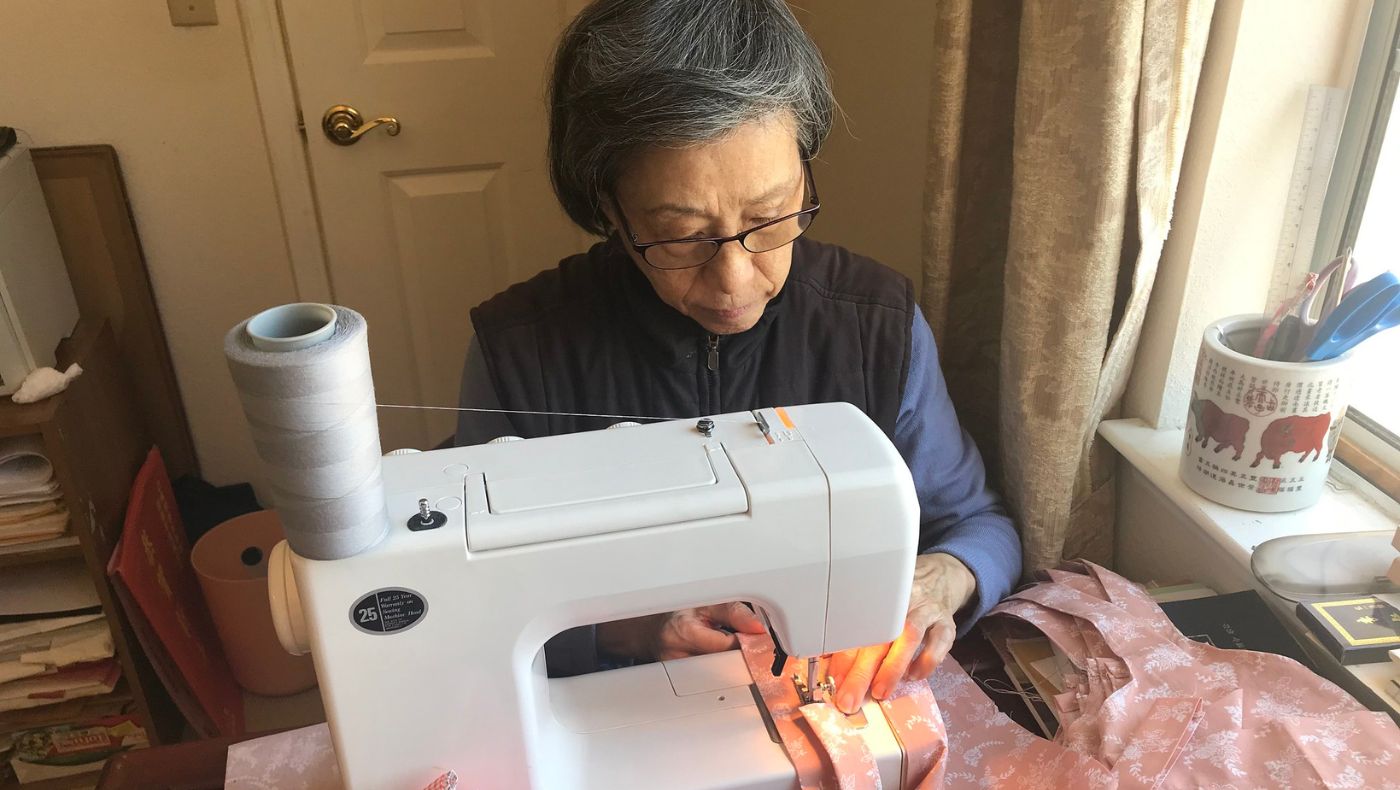
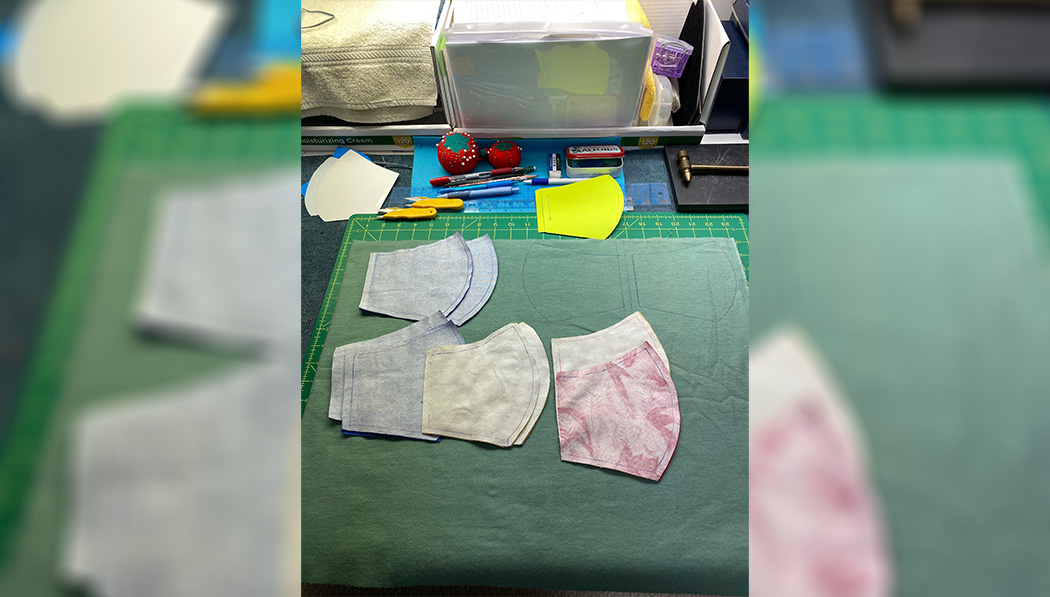
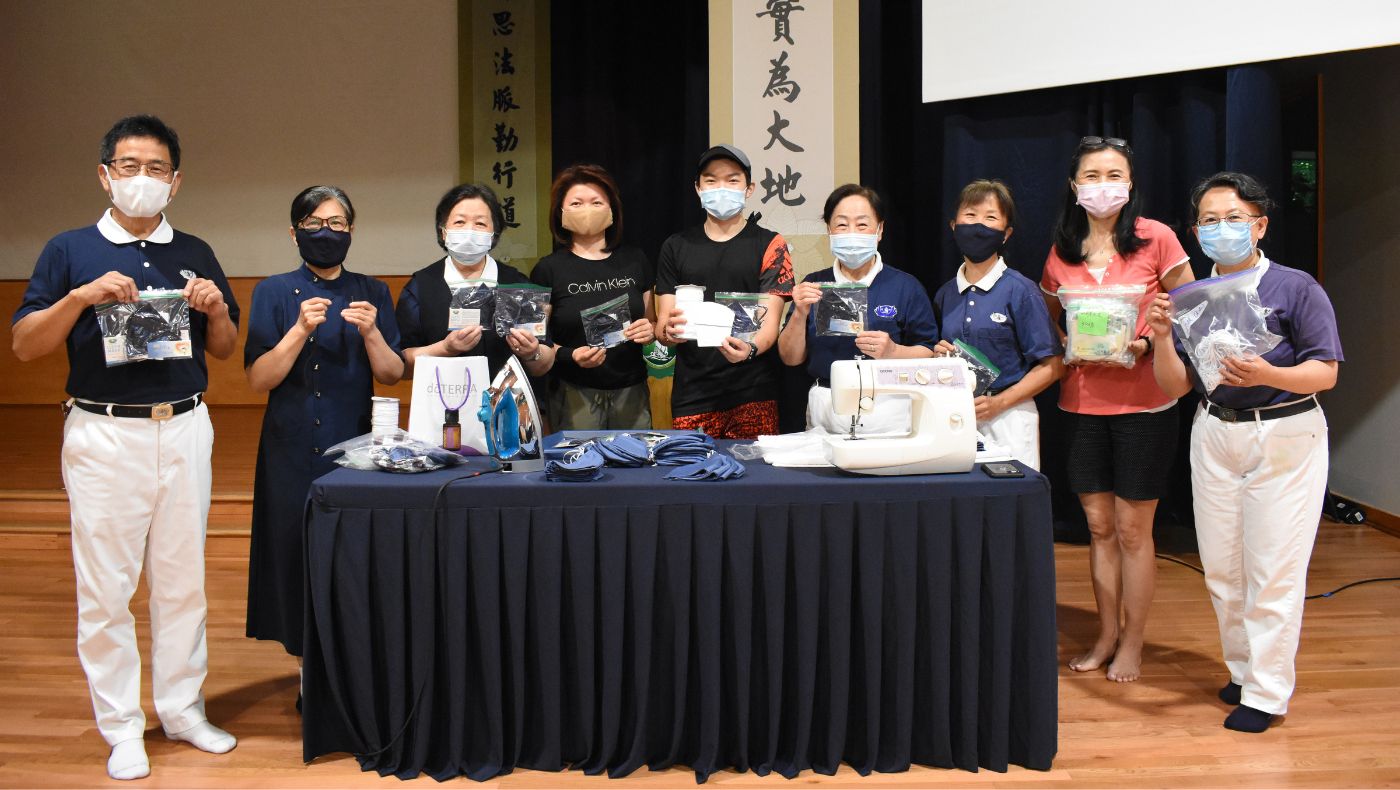
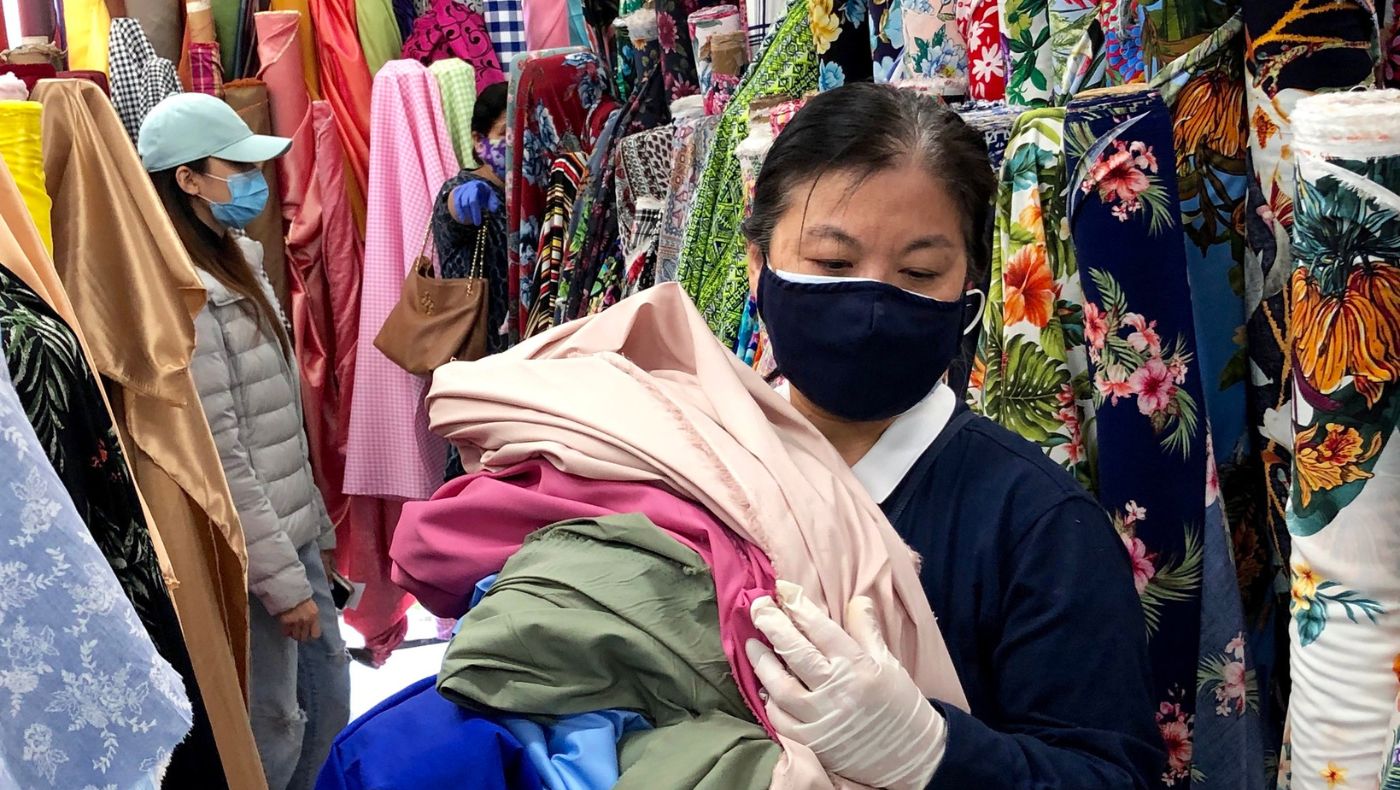
As these activities continued, other Tzu Chi volunteers showed their ingenuity and problem-solving abilities by making cloth masks and even caps at home. Like so many people at this time, many felt helpless while also spending an abundance of time at home. In both the San Francisco Bay Area and near Washington DC, Tzu Chi volunteers who could sew began to prepare masks to donate to children and adults through their local Tzu Chi offices. The thinking was this: if sewing volunteers could help lessen the general public’s demand for PPE, this would ease access to more effective PPE for those on the frontlines of COVID-19.
One such volunteer was Unchyong Yang from Tzu Chi USA’s Northwest Region Office. In addition to having taken continuing education classes in sewing at Tzu Chi, she had experience altering her husband’s clothing as well as sewing the curtains in her home. Armed with her sewing machine, Yang joined the mask-making team, and began watching YouTube tutorials on creating surgical caps and face masks for children, women, and men. But, it was a group effort, with some helping purchase material and others trimming them according to patterns. She recalls the difficulty of the former activity:
I still remember Sister Rita’s challenges getting the fabric. All the stores were closed at that time [because of the pandemic], so she asked around for favors from cloth shop owners to open and let us purchase material. For a while, cotton was in short supply. All of the volunteers turned their homes upside down to find unused cotton cloth to contribute.
Their hard work was well worth it. “When I heard that many doctors and nurses liked our product, took photos with them, and even wrote us thank you cards, I felt very content,” Yang shared. Indeed, at 76-years-young, it was both a safe and rewarding way for her to contribute at a time of crisis. Jean Ho, a teacher and administrator at Tzu Chi Academy, Washington DC, expressed a similar sentiment when she joined her local mask-making team. When care recipients from the community discovered they could choose between the different masks that were made, Ho said:
They all had bright smiles on their faces. They discussed what each of them might like, or whether grandma at home might like a certain color. Those with children told us their children would be so happy seeing these cute masks. Within an hour, we had given away almost 200 cloth masks.
The Stories Behind the Mask
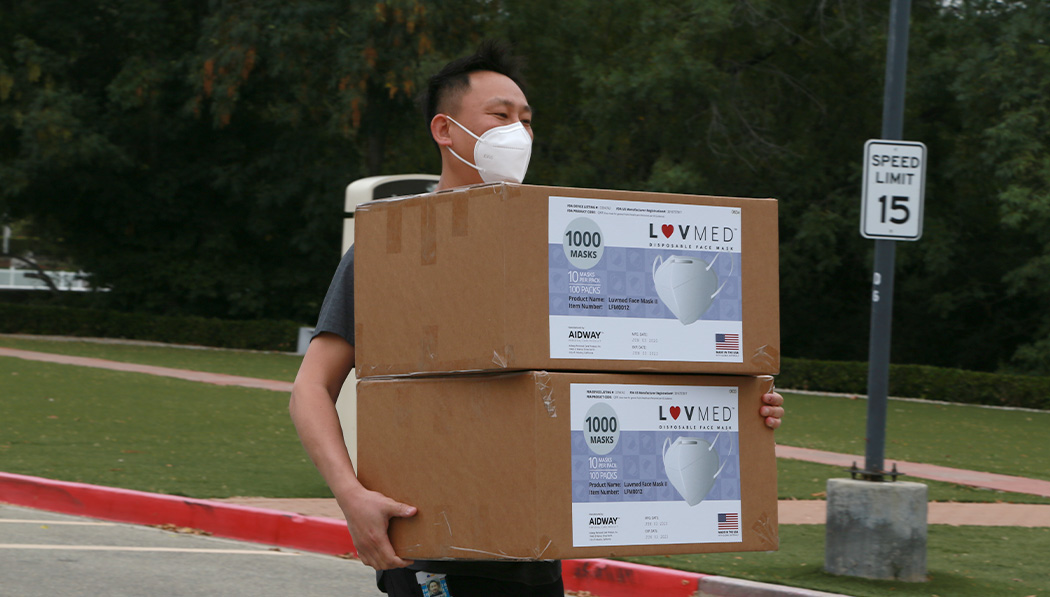
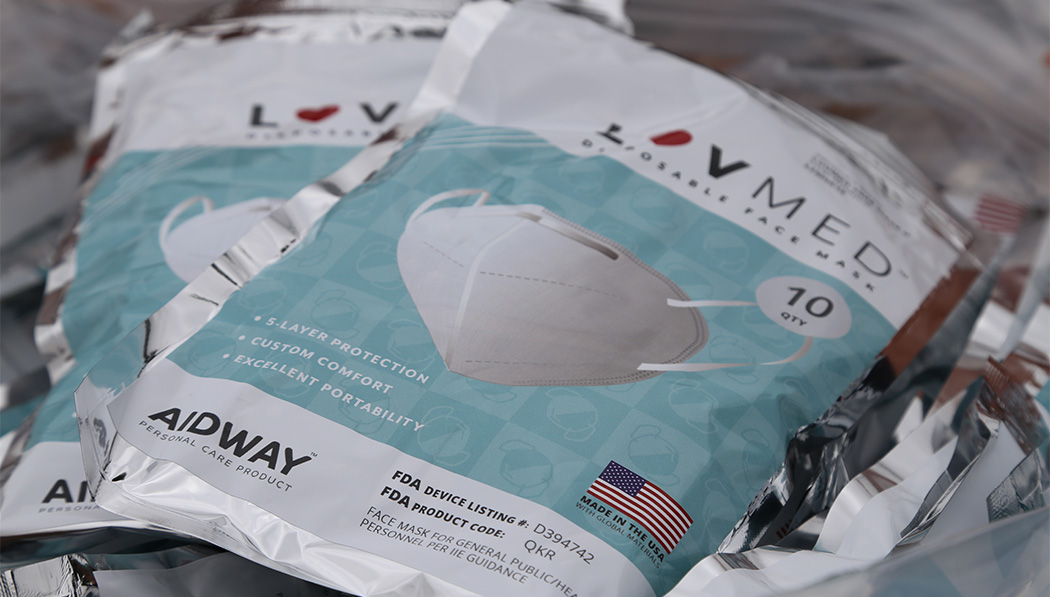
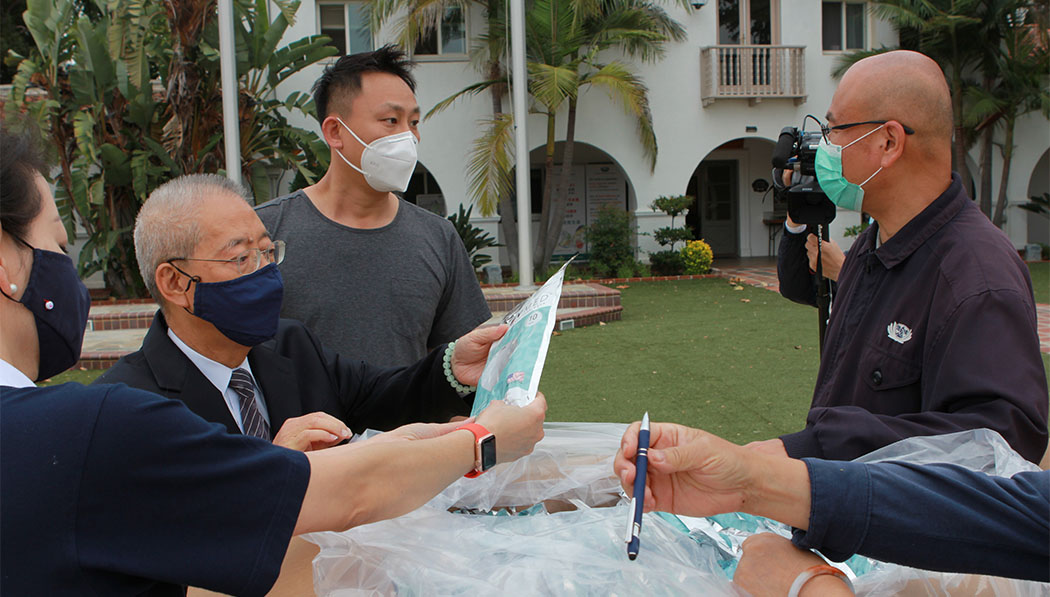
Despite these efforts and those made by public health campaigns, masking was still an inconsistent activity for many Americans. According to findings from the USC Dornsife’s Understanding Coronavirus in America Study, nearly ⅕ of U.S. adults did not believe mask wearing was effective during the first year of the pandemic. Recognizing the need to turn the symbolism of masking into a positive one, Tzu Chi USA launched a digital storytelling campaign called #MyMaskMyStory.
Inspired by the popular photoblog Humans of New York, #MyMaskMyStory sought to share the individual stories of Tzu Chi volunteers, donors, care recipients, and more. The goal was to offer readers relatable stories of people who were experiencing the pandemic from very different angles, and who were proudly wearing their mask to protect both themselves and others from contracting the virus. One story was from Ronald Kuo, a young entrepreneur in California who pivoted his furniture making factory to produce N95 respirators.
“I grew up in Tainan, Taiwan, and came here at 17 years old. I worked my way from language school to college, started work after graduation, and created my current business. What I have now is all that this land has given me, so I often think about how to do something to give back to the community,” his story read. Seeing the need for PPE rise, and with the right connections to bring mask-making efforts to California, Kuo began producing up to 60,000 respirators a month for donation.
At the same time, Kuo admitted his hands were tied with manufacturing. “We are a furniture factory, without many contacts or connections to reach hospitals and those who would really need masks,” he explained. But, because of his many connections to Tzu Chi, including his mom being a Tzu Chi volunteer in Taiwan and being friends with another volunteer in California, Kuo realized it would be best to join forces and ask Tzu Chi USA to help distribute thousands of his donated N95 respirators monthly. Hoping to inspire others, he had this to say:
“If every person, each with their own strengths, can help another person, this energy can make our world a better place. I feel this is something everyone should do.
Another person who was featured in #MyMaskMyStory was Nicole Peterson Orr, Interim Executive Director at the Riverside University Health System Foundation. Receiving a donation of 2,000 surgical masks, 480 N95s, 300 antiviral coveralls, 300 face shields, and 300 pairs of goggles from Tzu Chi, she remarked that the gesture “creates such a sense of community… I know that our staff, our front line staff, feel well cared for because of your giving and your volunteerism.” At the same time, Orr had also accepted a unique offer from Tzu Chi Medical, namely to receive 300 vegetarian lunch boxes as part of another campaign: A Better Meal, A Better Earth.
World-Awakening Realizations
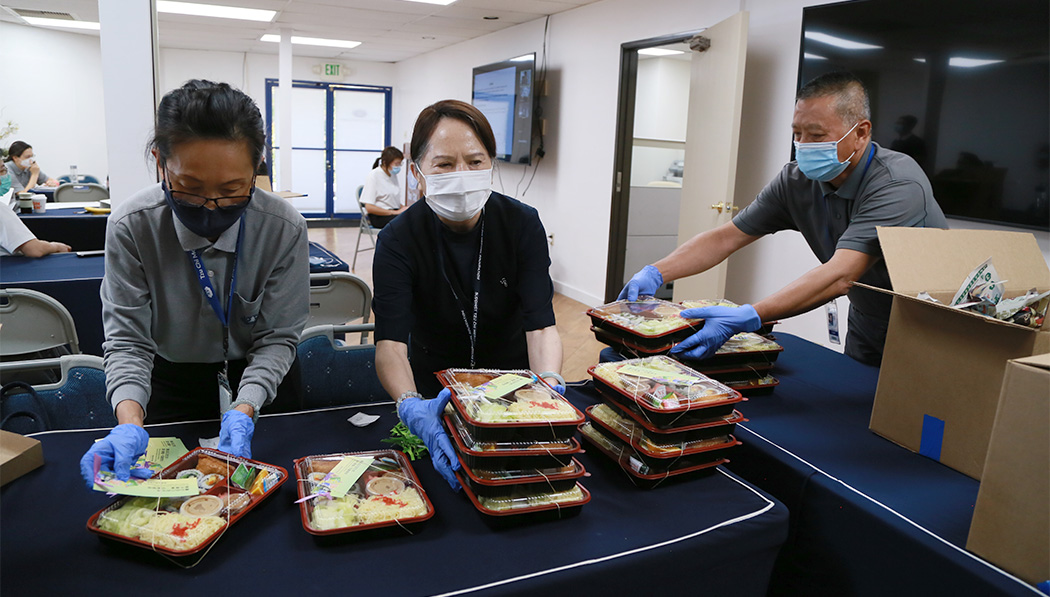
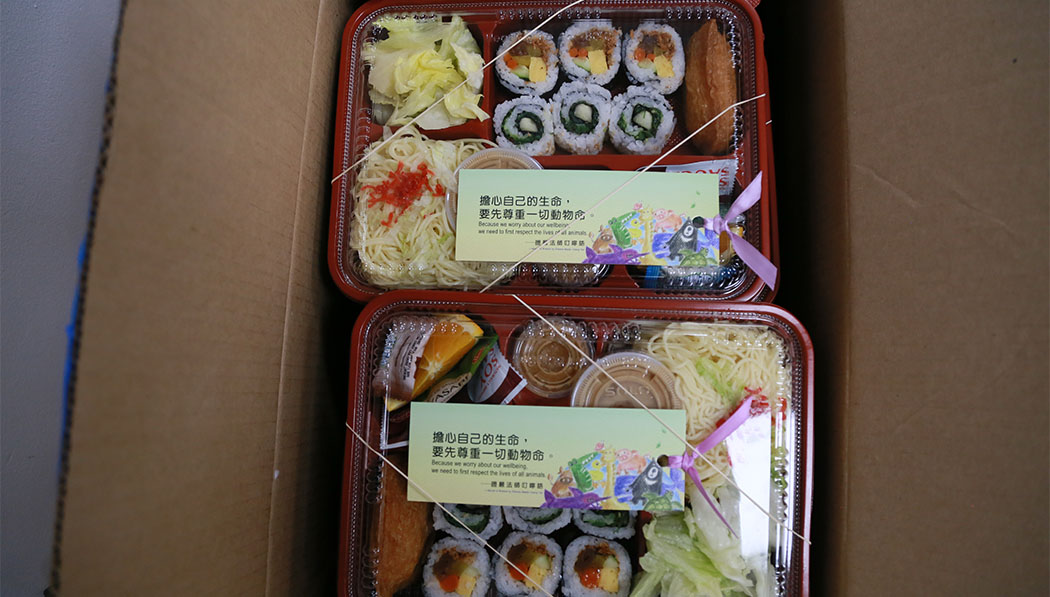
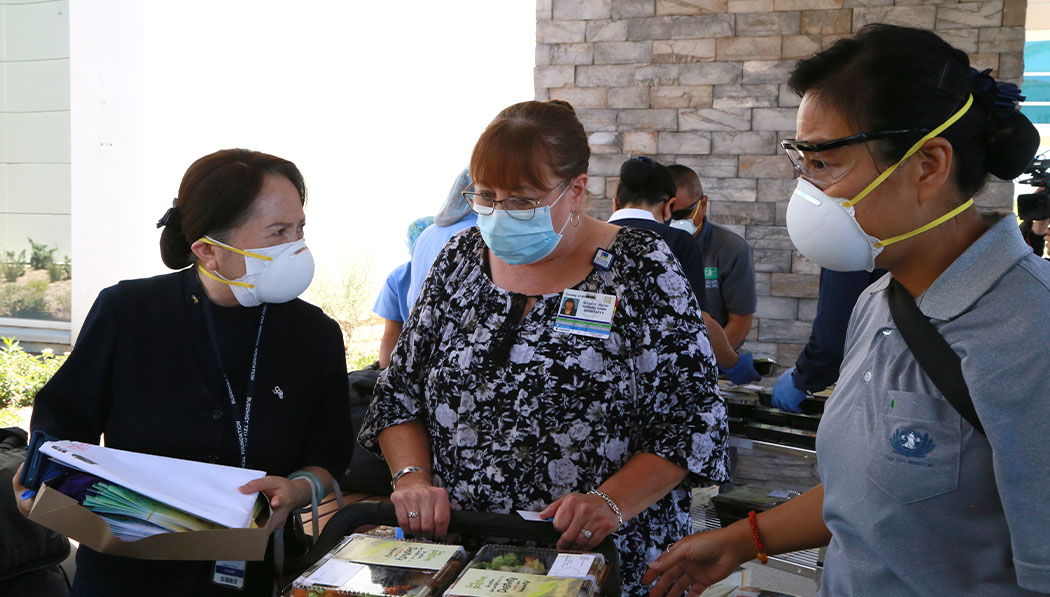
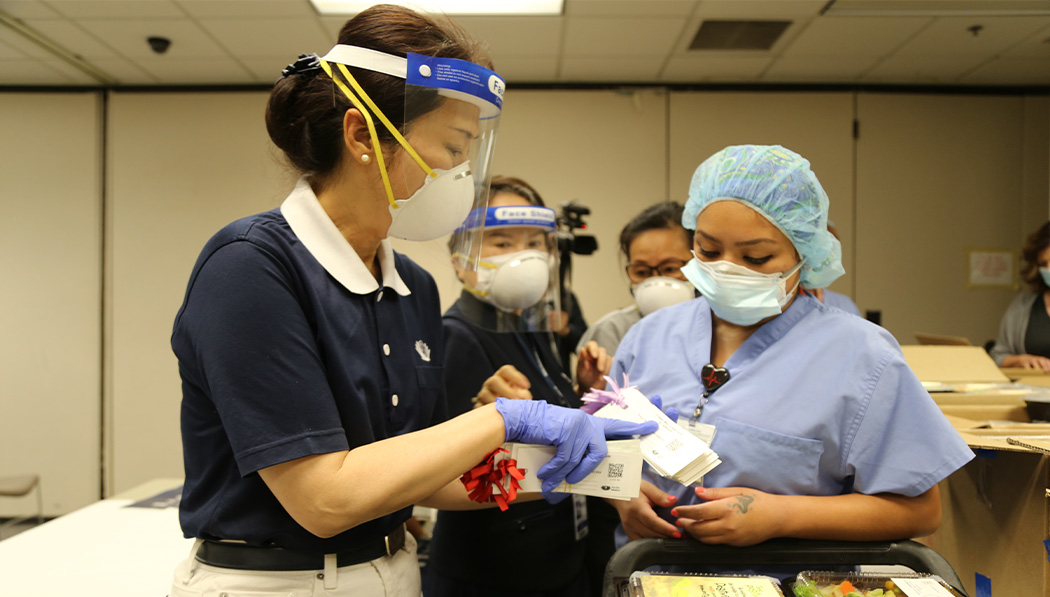
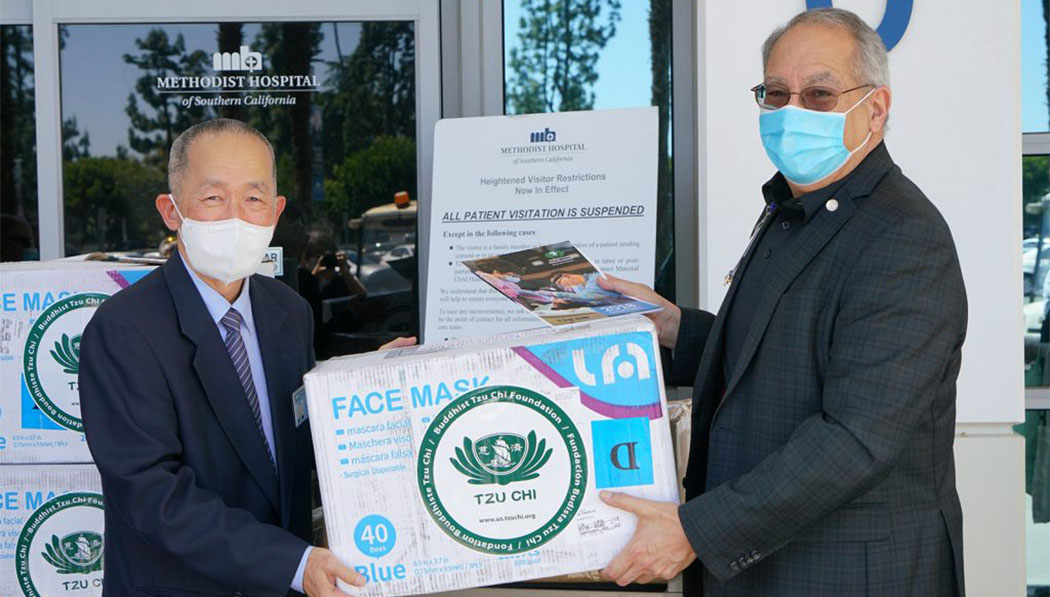
Since the onset of the pandemic, Dharma Master Cheng Yen had been issuing an urgent call to all Tzu Chi volunteers: Stop eating animal products and go completely vegetarian. Outside of believing in the sanctity of all sentient beings, Master proposed that global animal farming practices were increasing the incidence of deadly diseases from increased contact between humans and animals. To her, not only was this zoonotic interaction the potential source of SARS-CoV-2 (especially after initial links to an open-air wet market in Wuhan, China), but the karmic consequences of routinely killing innocent beings was leading humanity’s downfall. Yet, Master believed there was hope:
Because this disease was introduced from people’s mouths, upholding a vegetarian diet is the most basic way to prevent the disease. Grains and plants are the best natural foods in the world to nourish humanity. Therefore, adopting a vegetarian diet will bring better health and peace to our world.
Dharma Master Cheng Yen
With this guidance as their inspiration, then-Tzu Chi Medical CEO Dr. Keh and his wife, Mary Keh, launched A Better Meal, A Better Earth. It involved the efforts of cooking volunteers to prepare vegetarian lunch boxes to donate to healthcare institutions in California. Their goal was to boost morale and say ‘thank you’ to frontline workers with nourishing meals made with love from Tzu Chi volunteers, but also to open conversations on vegetarianism while enjoying delicious vegetarian foods. Touched that Tzu Chi volunteers fed her colleagues so thoughtfully, Orr said:
We [also] especially appreciate the meals that came [from Tzu Chi]. The vegetarian meals are healthy, and we really like when we can provide healthy meals to our teams who are out there working. It’s better for them and we know they feel better when they’re on the job.
However, volunteers held sober expectations of the campaign. While eating a single vegetarian meal was not guaranteed to turn lifelong omnivores into vegetarians right away, promoting mindfulness around the consumption of animal products as well as encouraging care recipients to eat less meat was a significantly more tangible goal. Orr’s colleague, nursing administrator Wendy Roop promised volunteers that she’d eat one less meat-involving meal a day. Though a small step, it was one in the right direction.
